
Home / English Composition / Speech Writing for Class 6 Format Topics and Examples
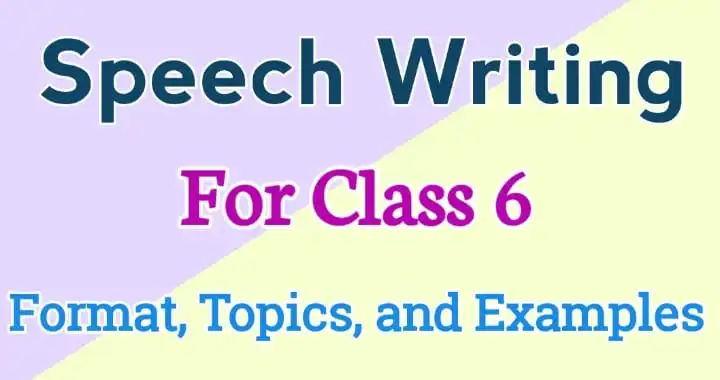

Speech Writing for Class 6 Format Topics and Examples
Learn the art of speech writing for Class 6 format with engaging topics and examples. Develop essential communication skills, structure your ideas, and captivate your audience effectively. Enhance your confidence and excel in delivering impressive speeches with this comprehensive guide.
Speech writing is the process of creating a talk or presentation that someone will deliver to an audience. It involves organizing ideas and thoughts in a clear and persuasive manner.
When it comes to developing essential communication skills, speech writing plays a vital role in the academic journey of a class 6 student.
The ability to express ideas effectively through spoken words not only enhances confidence but also helps in shaping a young mind to become an articulate and persuasive individual.
In this article, we will explore various exciting and engaging speech writing topics that are specifically tailored for class 6 students. These topics are carefully selected to spark creativity, critical thinking, and self-expression in young minds.
Format of Writing Speech for Class 6
Speech writing is the art of crafting spoken words to convey a message effectively and persuasively to an audience. It involves structuring the speech with a clear introduction, main points, and a conclusion.
Speech writing for Class 6 follows a structured format to ensure clarity and coherence in delivering an effective message.
1. The format typically includes an introduction, where you greet the audience and introduce your topic.
2. The body contains the main points or arguments supported by examples and evidence.
3. Use simple language and maintain a conversational tone.
4. The conclusion summarizes the key points and leaves a lasting impression on the audience.
With this format, Class 6 students can master the art of speech writing , honing their
communication skills and becoming proficient public speakers.
How to Write Speech for Class 6
Speech writing for class 6 can be an exciting and rewarding experience.
To create an engaging speech, start by selecting a topic that interests you and your audience.
Begin the speech with a catchy introduction to grab attention,
Develop each point with supporting details and examples, making sure to keep it brief and focused.
Use transition words to flow smoothly from one idea to the next.
In the conclusion, summarize the main points and leave the audience with a memorable closing statement.
You may also like
Introductory and Concluding Words Used for Writing Speech for Class 6
Writing a compelling speech for class 6 requires an engaging introduction that captures your audience’s attention right from the beginning. By using the right introductory words, you can set the tone for your speech and create a connection with your listeners.
Introductory Words :
Good morning, Respected Principal, Teachers, and my dear friends …….
Good morning/afternoon …….
Dear classmates …….
Ladies and gentlemen: …….
Did you know …….
Imagine …….
Have you ever …….
Today, I want to talk about …….
In this speech, I will discuss …….
Picture this …….
I am excited to share …….
Concluding Words:
“Thank you”.
Speech Writing Topics for Class 6
“ Speech Writing Topics for Class 6″ offers a diverse range of engaging and age-appropriate topics for young students to develop their communication skills. These Speech Writing 51 Topics for Class 6 cover areas such as personal experiences, hobbies, values, environmental awareness, technology, and more, providing opportunities for students to express their thoughts and ideas confidently.
1. My Favorite Hobby: Why I Love [hobby]
2. The Magic of Books: Why Reading is Important
3. My Dream Vacation Destination and Why I Want to Go There
4. The Role of Friendship in Our Lives
5. The Importance of Eating Healthy Foods
6. Why Pets Make Great Companions
7. How to Be a Good and Responsible Pet Owner
8. The Value of Saving Money and Setting Goals
9. The Influence of Role Models in My Life
10. The Impact of Technology on Our Daily Lives
11. The Beauty of Nature and Conservation Efforts
12. The Benefits of Exercise and Staying Active
13. My Favorite Fairy Tale and Its Moral Lessons
14. The Power of Kindness and How It Can Change the World
15. Overcoming a Challenge and What I Learned from It
16. The Role of Respect in Building Strong Relationships
17. The Importance of Honesty and Integrity in Our Actions
18. How I Can Make a Difference in My Community
19. The Significance of Family and Family Traditions
20. The Role of Education in Shaping Our Future
21. The Impact of Music and Art in My Life
22. The Power of Dreams and Aspirations
23. The Wonder of Science and Its Discoveries
24. The Value of Water and the Need for Conservation
25 The Role of Sports in Promoting Teamwork and Discipline
26. The Importance of Being Grateful and Showing Appreciation
27. The Impact of Bullying and How We Can Stop It
28. The Joy of Giving: How Helping Others Makes Us Happy
29. The Significance of National Holidays and Celebrations
30. The Role of Technology in Enhancing Learning
31. The Power of Imagination and Creative Thinking
32. The Journey of a Caterpillar to Becoming a Butterfly: Life Lessons
33. My Favorite Superhero and Their Inspiring Qualities
34. The Influence of My Parents and Their Guidance
35. The Impact of Pollution on Our Environment
36. The Importance of Setting Personal Goals
37. The Role of Heroes in History and What We Can Learn from Them
38. The Beauty of Different Cultures and Diversity
40. The Joy of Volunteering and Giving Back to the Community
41. The Power of Positive Thinking and Its Effects on Our Lives
42. The Wonder of the Solar System and Space Exploration
43. The Role of Nutrition in Keeping Us Healthy
44. The Significance of Good Manners and Politeness
45. The Importance of Protecting Endangered Animals
46. The Role of Media in Shaping Our Opinions
47. The Impact of Plastic Waste on Our Oceans and Marine Life
48. The Benefits of Learning a Second Language
49. The Influence of Fairy Tales and Folklore in Our Culture
50. The Role of Games and Play in Our Development
51. The Power of Small Acts of Kindness in Making a Big Difference
Examples of Speech Writing for Class 6
When it comes to developing essential communication skills, speech writing plays a vital role in the academic journey of a class 6 student. The ability to express ideas effectively through spoken words not only enhances confidence but also helps in shaping a young mind to become an articulate and persuasive individual. In this article, we will explore various exciting and engaging speech writing topics that are specifically tailored for class 6 students. These topics are carefully selected to spark creativity, critical thinking, and self-expression in young minds.
Speech: Independence Day Celebration 2023
Good morning respected teachers, distinguished guests, dear classmates, and fellow citizens,
Today, as we gather to celebrate Independence Day, we stand on the threshold of history, reflecting on the monumental journey that brought us freedom. On this day, we pay tribute to the brave souls who valiantly fought against tyranny, sacrificing their lives for the noble cause of liberty.
Independence Day is not merely a date; it’s a reminder of the sacrifices made and the battles won to secure our nation’s sovereignty. It’s a day to honor the visionaries who dreamt of a free India, and the countless individuals who turned that dream into a reality.
As we hoist our national flag, let’s remember that freedom comes with responsibilities. We must uphold the ideals of unity, diversity, and progress that our forefathers cherished. It’s our duty to ensure that their sacrifices were not in vain, by working towards a nation where every citizen can thrive and prosper.
Let this day inspire us to rise above differences and work together for a better future. Let’s pledge to build a society where justice prevails, opportunities abound, and peace reigns. Happy Independence Day, and may our nation continue to shine as a beacon of hope and freedom.
Speech: My Favorite Book Character
Good morning/afternoon dear classmates and respected teachers,
Today, I want to share with you all about my favorite book character. The character that has captured my heart and imagination is none other than [Name of the Character]. This fascinating protagonist comes from the book [Name of the Book], written by [Author’s Name].
[Name of the Character] is a brave, adventurous, and kind-hearted individual. They possess qualities that I truly admire and wish to emulate. Through their journey in the book, I have learned valuable life lessons, such as the importance of courage, perseverance, and friendship.
Their remarkable adventures have taken me to magical worlds and taught me the power of imagination. Whenever I read about [Name of the Character], I feel like I am a part of their extraordinary world.
In conclusion, [Name of the Character] is not just a fictional creation; they have become a source of inspiration and a true friend to me. I will always cherish the memories of their adventures and the lessons they have taught me.
Thank you for listening!
Speech: Importance of Trees
Good morning/afternoon dear teachers and fellow students,
Today, I stand before you to express my views about the importance of trees. Trees are not just a part of our environment; they are essential to our very existence. They provide us with oxygen, absorb harmful carbon dioxide, and help in maintaining the ecological balance. Trees offer shade, shelter, and a habitat for various animals and birds.
Additionally, trees play a crucial role in preventing soil erosion, conserving water, and enhancing biodiversity. They also beautify our surroundings, providing a sense of tranquility and peace.
As responsible citizens, it is our duty to protect and preserve our green friends. By planting more trees and caring for existing ones, we can contribute to a greener and healthier planet.
Let’s join hands in safeguarding these invaluable gifts of nature. Together, we can make a significant impact on our environment and secure a sustainable future for generations to come.
Speech: My Dream Career
Good morning teachers and fellow students,
Today, I stand before you to talk about my aspirations and the career that fills me with excitement – my dream career. As a class 6 student, I dream of becoming a veterinarian.
From a young age, I’ve been fascinated by animals and their well-being. The idea of helping and caring for them brings immense joy to my heart. In my dream career, I imagine myself surrounded by furry friends, healing their ailments, and providing comfort to their owners.
To achieve my dream, I am determined to study hard, learn all about animal care, and never give up on my passion. I believe that with dedication and perseverance, my dream of becoming a veterinarian will come true, allowing me to make a positive impact on the lives of animals.
Thank you for listening to my dream career aspirations.
Speech: Act of Kindness
Good morning everyone,
Today, I want to talk about something that holds great significance in our lives and has the power to make the world a better place – acts of kindness. As a class 6 student, I have come to realize the importance of small acts of kindness and how they can have a big impact.
Acts of kindness can be as simple as offering a smile, helping a friend in need, or being there for someone who feels lonely. These actions might seem small, but they create ripples of positivity that spread far and wide.
Together, we can create a world where kindness flourishes, leaving an indelible mark on every heart it touches. We can also create a chain reaction of goodness that makes our school, our community, and the world a more compassionate and caring place.
Let us make a conscious effort to be kind every day. Each act of kindness, no matter how small, counts and can make a difference. So, let’s start today and sow seeds of kindness wherever we go.
Thank you for listening. Let’s be kind and make the world a brighter place for everyone.
Speech: Farewell to senior students
Dear teachers, respected seniors, and fellow students,
Today, we gather here to bid farewell to our dear senior students as they embark on a new journey beyond these school walls. As a class 6 student, I feel a mix of emotions – happy for their achievements, sad to see them go, but also excited for the possibilities that lie ahead.
Our seniors have been our role models, guiding us through challenges, and setting an excellent example for us to follow. They have been like older siblings, always there to support and encourage us.
This farewell party is an opportunity for us to express our gratitude and appreciation for their friendship and guidance. Let us cherish the memories we’ve created together and wish them success in their future endeavors.
To our seniors, we thank you for being a source of inspiration and leaving behind a legacy of excellence. As you move forward, know that you carry a piece of our hearts with you.
Congratulations and best wishes to our beloved seniors. Farewell!
Thank you all.
Speech: Your School
Dear teachers, esteemed guests, and fellow students,
Today, I am thrilled to speak about a place that holds a special place in my heart – our school. As a class 6 student, my school is like a second home to me, a place where I not only gain knowledge but also build lasting memories and friendships.
Our school is more than just a building; it’s a nurturing environment that fosters growth and learning. The dedicated teachers inspire us to reach our full potential, and the supportive staff ensures a safe and happy atmosphere for us to thrive.
The vibrant classrooms, the playground echoing with laughter, and the school events make each day memorable. It is a place where we celebrate our achievements and learn from our challenges.
I am grateful for the opportunities our school provides, and I am proud to be a part of this wonderful community. Together, let’s make our school an even better place for learning and growing.
Thank you all for being a part of this incredible journey in our school.
Speech: World Environment Day
Ladies and gentlemen, teachers, and my dear fellow students,
Today, we gather here to mark a significant occasion that calls for our attention and action – World Environment Day. As a class 6 student, I feel a deep sense of responsibility toward our planet and its well-being.
World Environment Day reminds us of the importance of preserving and protecting our environment. It’s a day when we come together as a global community to raise awareness about environmental issues and take steps to make a positive impact.
As young individuals, we have the power to bring about change. We can plant trees, conserve water, reduce waste, and adopt eco-friendly practices in our daily lives.
Let us pledge to be guardians of our environment, caring for nature as it cares for us. By doing so, we can ensure a greener, healthier, and more sustainable future for generations to come.
Thank you for your attention, and let us celebrate World Environment Day with a renewed commitment to protect our planet.
Speech: why students should obey their elders
Respected teachers and dear friends,
Today, I stand before you to shed light on a topic that holds great importance in our lives – why students should obey their elders. As class 6 students, we may sometimes wonder why it’s essential to listen to our elders, but there are compelling reasons for doing so.
Firstly, our elders have a wealth of experience and wisdom that comes from living through various situations. Their guidance can help us make better decisions and avoid pitfalls.
Secondly, obeying our elders shows respect and appreciation for their knowledge and care. It strengthens the bond between generations and fosters a sense of unity in our families and communities.
Lastly, obeying our elders teaches us discipline and helps us become responsible individuals. It prepares us to face challenges and handle responsibilities in the future.
Let us recognize the value of our elders’ advice and embrace the wisdom they offer. By doing so, we not only honor them but also empower ourselves to become better individuals.
Thank you for listening.
Speech: About Yourself
Hello everyone,
Today, I stand before you to share a little bit about myself. As a class 6 student, I believe it’s essential for us to know and understand each other better, building a strong and supportive community.
My name is [Your Name], and I am [Your Age] years old. I come from [Your City or Country], a place I hold close to my heart. I have a passion for [Your Hobbies or Interests], which brings me joy and fulfillment.
In school, my favorite subjects are [Your Favorite Subjects], and I enjoy learning new things every day. I am also an avid reader, exploring different worlds through books.
Apart from academics, I love spending time with my family and friends, creating cherished memories together.
I believe that each of us is unique and brings something special to this world. Let’s embrace our individuality and support one another on this exciting journey of growth and learning.
Thank you for giving me the opportunity to introduce myself. I look forward to getting to know all of you better too.
Speech: Healthy Habits makes life Happy
Today, I want to talk about something that is the key to a happy life – healthy habits. As class 6 students, we are at an age where developing good habits can set us on a path of lifelong well-being.
Healthy habits encompass a range of practices, from eating nutritious foods and staying physically active to getting enough sleep and managing stress. When we adopt these habits, we not only feel better physically but also mentally and emotionally.
Regular exercise keeps our bodies strong and energetic, while nutritious meals fuel our minds for better learning and focus. Adequate sleep allows us to rejuvenate and be more productive during the day.
Taking care of ourselves also includes taking care of our surroundings and the environment. Let’s remember to keep our surroundings clean and minimize waste.
By cultivating healthy habits from a young age, we are laying a strong foundation for a happier and fulfilling life ahead. So, let’s pledge to prioritize our health and well-being and inspire others to do the same.
Speech: Your Favourite Sport
Ladies and gentlemen, teachers, and my dear friends,
Today, I am thrilled to talk about something that fills my heart with excitement – my favorite sport. As a class 6 student, I have discovered a passion for [Your Favorite Sport], and it has become an integral part of my life.
[Your Favorite Sport] is not just a game; it’s a thrilling experience that brings joy and adrenaline rush. Whether I am playing with my friends or watching professional players in action, it captivates me every time.
Engaging in this sport has been an enriching experience, instilling in me the vital values of teamwork, discipline, and perseverance. Furthermore, it has become the driving force behind my physical activity and mental focus, pushing me to constantly challenge and better myself.
The camaraderie and the sense of achievement I feel after a game is unparalleled. It’s a sport that challenges me to push my limits and become a better version of myself.
I encourage all of you to find and embrace a favorite sport too. It’s not just about winning; it’s about the joy of playing and the lessons we learn along the way.
Thank you for listening. Let’s celebrate the love for sports and stay active and healthy together.
Speech: Value of Friendship
Dear teachers and fellow students,
Today, I want to talk about something that is truly priceless in our lives – the value of friendship. As class 6 students, we are at an age where friendships are forming, and they play a significant role in shaping who we are.
Friendship is more than just a word; it’s a beautiful bond that brings joy, support, and understanding. True friends stand by us through thick and thin, sharing our laughter and wiping away our tears.
They inspire us to be better individuals, offering encouragement and honest advice. With friends by our side, we feel a sense of belonging and acceptance.
Friendships also teach us essential life skills, like cooperation, empathy, and compromise. As we grow together, we learn the importance of trust and loyalty.
Let us cherish and nurture our friendships, celebrating the uniqueness of each friend. Together, let’s create a caring and compassionate community, where everyone feels valued and appreciated.
Thank you for listening. Let’s embrace the beautiful gift of friendship and make our lives more meaningful and fulfilling.
Speech: The value of learning from mistakes
Today, I want to share an essential life lesson that we all encounter on our journey of learning and growth – the value of learning from mistakes. As class 6 students, it’s natural for us to make mistakes as we explore new subjects and experiences.
Mistakes are not failures; they are opportunities to learn and improve. Each mistake offers valuable insights that help us understand our weaknesses and areas for growth.
When we embrace our mistakes and take responsibility for them, we become resilient and open to new possibilities. It’s through these experiences that we develop problem-solving skills and gain the confidence to face challenges.
Let’s remember that making mistakes is a part of being human, and it’s okay to stumble as long as we rise stronger each time.
So, let’s view mistakes as stepping stones to success, learning from them, and growing into better versions of ourselves.
Speech: The impact of technology on education
Good morning teachers and dear friends,
Today, I want to talk about a subject that has revolutionized the way we learn – the impact of technology on education. As class 6 students, we are fortunate to live in a time when technology plays a crucial role in our classrooms.
The advent of technology has revolutionized education, creating a dynamic and accessible learning environment that fosters interaction and engagement among students. With computers, tablets, and the internet, we have a vast sea of information at our fingertips. It enables us to explore diverse subjects and expand our knowledge beyond textbooks.
Digital tools and educational apps provide interactive learning experiences, making lessons fun and memorable. Virtual classrooms and online resources have made education available to students around the world, breaking down geographical barriers.
However, with this technological advancement, it’s crucial to use technology responsibly and ensure a balance between screen time and other activities.
Together, let’s harness the power of technology to become lifelong learners and shape a bright future.
Speech: The influence of social media
Dear teachers and my dear friends,
Today, I want to discuss a topic that has a significant impact on our lives – the influence of social media. As class 6 students, many of us are exposed to social media platforms and the digital world.
social media allows us to stay connected with friends and family, discover new interests, and access a wealth of knowledge.
However, we must be mindful of the influence of social media. It’s essential to use social media responsibly and respectfully, being kind to others and protecting our privacy.
Let’s remember that while social media can be a powerful tool for learning and communication, we must strike a balance and prioritize face-to-face interactions and outdoor activities.
Thank you for listening. Let’s use social media wisely and make the most of its positive aspects.
Speech: The Power of Imagination
Today, I want to talk about something that resides within each of us and has the power to shape our world – the power of imagination. As class 6 students, we have incredible imaginations that can take us on extraordinary journeys.
Imagination allows us to dream, create, and envision possibilities beyond the confines of reality. It is the spark that ignites our creativity, helping us to solve problems in unique ways.
Through imagination, we can explore distant galaxies, dive into the depths of the ocean, or venture into mythical lands. It knows no boundaries and encourages us to think outside the box.
Let’s embrace the power of our imagination, for it is the seed of innovation and the gateway to endless opportunities. With imagination as our ally, we can shape a world full of wonder and endless possibilities.
Frequently Asked Questions Speech Writing for Class 6
Q. 1. How can I prepare for giving a speech in class 6?
Ans: To prepare for giving a speech, practice regularly in front of a mirror or with family and friends. Focus on speaking clearly, maintaining eye contact, and using expressive gestures.
Q. 2. Are these speech topics suitable for other grade levels?
Ans: Absolutely! While these topics are tailored for class 6 students, they can be adapted for other grade levels with slight modifications.
Q. 3. How long should a class 6 speech be?
Ans: Aim for a speech that lasts around 3-5 minutes. It’s essential to keep it concise and engaging.
Q. 4. Can I use props during my speech?
Ans: Yes, using props can enhance your speech and make it more engaging. However, ensure they are relevant and add value to your presentation.
Q. 5. Is it okay to be nervous before giving a speech?
Ans: It is entirely normal to feel nervous before public speaking. Remember, even seasoned speakers experience nerves. Practice and preparation will help you feel more confident.
Recommended Articles:

Speech Writing Class 6 CBSE Format, Examples, Topics, Exercises
A speech is used to convey information orally to a number of people. The purpose of a speech is:
- to convince the listeners about the speaker’s point of view
- to pass on a wide range of information
- to express an opinion, share a point of view, experience, observation, etc.
Looking for an easy way to Learning of new elementary english grammar and composition for class 6 answers, Solutions. You have to learn basic English Grammar topics like Tenses Verbs, Nouns, etc… In this article, we will review the best English Grammer Topics and compare them against each other
Speech Writing Class 6 Format, Examples, Topics, Exercises PDF
Fundamental:
- A speech does not require a strict format or a fixed style.
- There is no need of a headline/caption. If you wish, you can begin with the question number.
- Begin with a pleasant address.
For example:
- Good morning, ladies and gentlemen, respected principal, teachers and my dear friends.
A self-introduction is very common.
For example: I am Rajan Sharma from class VI B and I feel honoured to be given an opportunity to speak about global warming.
- Follow the FCCS method. FCCS stands for Facts, Causes, Consequences and Solutions. To know more about FCCS, read
- Introduction to Writing.
- Attract the audience with lively jokes, quotes, news, songs, etc.
- Convince the audience with facts.
- Conclude by leaving a message.
- End with a word of thanks.
Speech Writing Class 6 CBSE Sample Example With Answer
Some people say that television is a very useful tool when it comes to education. Others argue that television is a medium of entertainment only. Discuss both of these views and write a speech upon the usefulness of television as an educational tool in not more than 150 words.
| Television- A Tool for Education or Entertainment Respected Principal Madam, worthy teachers and my dear friends. Today I am! going to speak on the topic TV- A Tool for Education or Entertainment. One of the most important inventions of the human history is the television (TV). Since j it was invented, the broadcasting machine has been used for many purposes. It j helps people relax, entertain them, and help in education. Nowadays, in this hasty pace of life, people are spending more and more time on getting knowledge on TV not only for their jobs but also for daily purposes. The entertaining purpose of TV is apparent, and it is an important purpose, too. After working hard, a person needs to rest, also, after being educated, he craves I for being entertained. Teaching is not all, but when teaching and entertaining can j go together then it can have a good effect on TV viewers. The knowledge that they got earlier can be absorbed more easily later on. They can listen to music, watch game-shows and other pleasure activities. This way, the j stress that has strained viewers can be blown out more easily. The entertaining I programs on TV can also connect people all around the world, especially through interactive programs. People can share their opinions, their thoughts about certain I global issues, therefore, not only the understanding among countries is improved but also the problems at the time can be solved more easily. To sum up, the educating purpose of TV cannot be denied, there are also many programs on TV that are designed to make people laugh, cry, be happy or sad. TV should be seen as a device that can both educate and entertain viewers, not just a strict teacher who always forces his learners to be stressed with dry knowledge. Thank you. |
Speech Writing Class 6 CBSE Practice Example
A. “You may take a thousand risks and get away with it every time, but it takes only one accident, just one, to cause you injury or death.” In the light of the above statement, prepare a speech on the topic ‘Road Safety’ for the morning assembly. Give a suitable title. Do not exceed more than 150- 200 words. _________________________________________________________ _________________________________________________________ _________________________________________________________ _________________________________________________________ _________________________________________________________ _________________________________________________________
Leave a Reply
You must be logged in to post a comment.
35 Thought-Provoking Persuasive Writing Prompts For 6th Graders
Looking for a solid persuasive essay topic for your 6th grader?
The below post contains tons of great ideas that will get your 6th-grade students thinking, researching, debating, and writing!
I’m not talking about simple opinion writing topics – like their favorite food, favorite book, or how much money they should get for an allowance.
That is the the thing that my 3rd grade student would delight in arguing.
No, sixth graders are ready for more meaty topics that require a bit of research and thought. The more they dig into the topic and refine their point of view, the more they will sharpen their critical thinking and writing skills!
Don’t miss the free pdf printable at the bottom of this page with all of the ideas in one place!
Persuasive Writing Prompts For The 6th Grade Student
1. is a dress code ever necessary.
In this prompt, students will be asked to take a stance on whether or not they think there is ever a time to enforce a dress code. Are there times when someone should be told how to dress? Such as a school dress code or wedding? Or should people be allowed to dress in any way that expresses themselves or their personality?
2. Should recycling be mandatory instead of suggested?
Students will be asked to consider whether the government should be more aggressive about recycling. They will be working with the concepts of the benefits of recycling vs. the freedoms of people.
3. Should vending machines ban junk food?
6th grade students will be asked to argue for or against the ban of junk food in vending machines. Vending machines are often used by people who are hungry and in a hurry. The vending options are usually less than healthy. Should vending machine owners be required to provide better choices? Or should they be allowed to stock their machines as they see fit?
4. Is it okay to keep exotic animals as pets?
This persuasive topic will have students take a stance on whether or not it is a good idea to keep exotic animals as pets. They will need to consider the benefits and drawbacks of keeping exotic pets and present a strong argument for their position. Make sure the student has a good understanding of the topic and the different types and sizes of animals that some people keep as pets.
5. Should the federal government impose a tax on sugary drinks?
In this prompt, students will be asked to argue for or against a government tax on sugary drinks – similar to the tax on cigarettes. They will need to consider the potential benefits of such a tax. What would the tax money be spent on? Or should people be free to drink any kind of beverage they wish, no matter how healthy or unhealthy?
6. Should life skills be a greater focus for education?
In this prompt, students will be asked to take a stance on what should be taught in school. Should the schools be doubling down on the basics of reading, writing, and math since test scores have dipped? Or should schools start allotting more time for important life skills, like time management, personal finance, and cooking, which are things many young adults struggle with.
7. Should there be age limits to use social media?
Students will list specific reasons why there should or should not be age restrictions for facebook pages and other forms of social media.
8. Is it important to save endangered species?
Students will be asked argue why enndangered animals should or should not be protected. They may be quick to make up their mind, but make sure they do research and find factual reasons that support their opinions.
9. Should video games be considered a sport?
Even though video games do not require the physical activity of traditional sports, does it still require focus, skill, and grit that would make it a modern sport? Or should that title only be awarded to an activity that requires you to sweat?
10. Should there be a ban on plastic bags?
Everyone knows plastic bags are bad for the environment, but should they be banned? What would the alternative be?
11. Is it necessary to have physical books anymore?
In the age of digital everything, are paper books still necessary? College students are already buying digital books instead of expensive physical ones. What benefits would come from doing away with paper books? What drawbacks would there be for those without a computer or solid internet?
12. Is it important to teach physical education in schools?
What is the goal of physical education? Does it have a place in the academic environment of education? Should those things be taught at home or on a sports team instead of during school hours? Shouldn’t physical activity be optional? Or is PE a vital piece of knowledge for a well-rounded education?
13. Should zoos be banned?
Do zoos raise money and awareness for animal conservation…or do they imprison animals for a lifetime that should be free and in the wild?
14. Should recess be scheduled for all kids in school? Even high school students?
What are the benefits of taking an outside break with fresh air for students? Are other subjects too important to sacrifice the time? Could older students be more productive with some sunshine and fresh air during the day?
15. If a student has good grades all school year, should they still have to take standardized tests?
If a student has shown that they are learning and progressing academically, should they have to take a long standardized test? Are there other reasons to take these tests?
16. Is hunting cruel to animals?
Most people buy their meat at grocery stores these days, so is there really any reason to still hunt animals? Does harvesting animals keep humans safe? Or does it make sport of animal lives?
17. Should gas powered cars be outlawed?
Fossil fuels are wreaking havoc on the planet, so should gasoline powered vehicles become illegal? Are electric cars a better option? Do electric cars have any drawbacks?
18. Is a rewards program or discipline more effective to motivate students?
What incentivizes kids to dive into their work, when maybe they don’t want to? Is it a really strong rewards program that will motivate them to finish a difficult task? Or fear of a consequence if they don’t complete their work?
19. Should the United States require military service for men and women, like other countries do?
Many countries require their population to do some form of federal service. America has a draft registration for men, but not for women. Should both genders be required to serve our country? Would it strengthen our nation and our people to have a common experience with service? Or is it unfair to require people to pause their lives for 2 years during the prime of their youth?
20. Should healthcare be free for everybody?
Is it a human right to get healthcare for free? If the patient doesn’t pay, then who should pay for the treatment? What benefits and/or consequences could come from reshaping our healthcare system?
21. Should candy purchases be limited based on how many cavities you have?
Dental health is very serious. Should a kid’s candy be rationed based on their dental records? The more cavities, the less candy you can have – and vice versa?
22. Is it appropriate to let kids work at younger ages, like 10 or 12, if they can do the job?
Many kids today have a strong desire to work, make money, and be successful. We have child labor laws in place to protect kids, but could that be holding them back? If they can do a job, should they be allowed to be hired? Or would that be robbing a kid of their right to a carefree childhood?
23. Should foreign language be required in school or should it be one of the elective courses?
English is spoken nearly worldwide, as it is taught in many countries around the world. What benefits come from learning another language? Should students be able to choose another elective if they don’t want to learn a new language? Or should American children try harder to be multilingual?
24. Should students be allowed to use their cell phones during tests?
You cannot get away from cell phones these days. Even small children have them! They will be a readily available resource in most work places, so shouldn’t they be allowed during tests? Or are memorization and internalization of information important skills for students to learn?
25. Should plastic water bottles be banned?
Plastic water bottles are a huge problem in our environment. Should we outlaw them to help the Earth? What kind of things are one-use water bottles used for that might be important?
26. Is it more important to continue exploration of space or the ocean?
Many wonderful advancements and knowledge have come from space exploration, but we know precious little about our ocean which covers 2/3 of the planet. Should governments be investing money into finding what lies beneath the surface instead of what’s above our heads?
27. Should reading an analog clock still be taught in school?
Digital clocks are everywhere – on your phone, stove, microwave, computer, cable box. Do you really need to learn how an analog clock works anymore? Are there times that digital clocks may not be available? Or are they becoming as archaic as a sundial?
28. Is learning proper handwriting or fast typing more important in today’s world?
Many have stopped learning cursive handwriting, so should schools also stop focusing so much on print handwriting? Should kids be spending that time learning how to type on a keyboard instead?
29. Should the voting age be lowered so elementary school students can vote?
Kids today are developing opinions and beliefs at younger ages and want to be heard. Should we lower the voting age so that children can make more of a difference? Or are most children not quite ready to handle the responsibility of voting?
30. Should AI be allowed in writing school papers if calculators are allowed in math?
Many teachers are concerned about how to tell the difference between an AI-written essay and one written by a student. Should that be a concern? If math allows calculators, can’t English classes allow help from another form of artificial intelligence? What drawback could come from not expecting kids to write their own essays?
31. Are cell phones good or bad for your health?
Cell phones are common around the world now, but are they good for us? How do they benefit our health? How might they hurt our overall health?
32. Should bees become a protected species?
Many scientists have expressed concern about the dwindling number of bees. Should these important pollinators become a protected species like the bald eagle? Or is it unreasonable to expect a person not to kill a bee that is buzzing around them?
33. Is it ever appropriate to ban a book?
Many heated discussions have come up recently about banning books. Is there ever a time that certain books should be kept from kids – like an R rating on a movie? Or should kids be allowed to read whatever they are interested in? Should offensive content be censored or should it be learned from?
34. Should community service be required for kids, middle schoolers and up?
What good could come of requiring community service from children? Or should people only serve because they genuinely want to help their community?
35. Is reading or math more important in today’s world?
Which is a more crucial skill to master? Should kids be focused on reading at the highest levels? Or should they be focused on learning the language of math at the highest levels?
Click Here To Download A One Page PDF Printable Of All The Argumentative Essay Topics
The above text link will take you to a new window where you can download and print the topics today. No email required! Terms of Use : Homeschool, classroom, co-op, and personal use only.
These essay topics will go along with any persuasive writing unit in your writing curriculum ! Let your student go through the list and find the one that really gets them excited.
If you’re looking for more fun writing prompts, be sure to check out the picture writing prompts below. There are 40 images with corresponding text that will get your kid excited to write!
Leave a Reply Cancel reply
Your email address will not be published. Required fields are marked *
My Speech Class
Public Speaking Tips & Speech Topics
130 Awesome Speech Topics for Kids

Amanda Green was born in a small town in the west of Scotland, where everyone knows everyone. I joined the Toastmasters 15 years ago, and I served in nearly every office in the club since then. I love helping others gain confidence and skills they can apply in every day life.
Kids always do best when they are interested in what they are asked to talk about. But every child has different interests, and therein lies the challenge – selecting awesome speech topics that kids will want to talk about.
A few points you want to consider:
- If the topic is too “adult,” they may be too young to cope with what they find.
- If the topic is too simplistic, their growing sense of awareness may be stunted.

- Keep in mind the goal of the speech – do you want to educate, to entertain, to express ideas, or something else?
- Consider topic that suits child’s character: someone who has an extensive imagination won’t like the same topics as someone who is more factual and practical.
Here is a broad range of speech topics for kids you can choose from.
Family and friends, miscellaneous, more miscellaneous….
- Why I love my mom and dad
- Funny things my parents say
- Let me tell you about my imaginary friend
- Things that really happen at grandma’s house when mom and dad aren’t there
- Secrets my mom does all day when I’m not around
- What my brother/sister thinks of me
- What my dad does in the bathroom for all that time
- If I had a choice between getting money or spending time with my family, I would choose…
- What did I do for my mom last mother’s day
- Let me tell you about my family
- My family’s traditions
- Original projects to surprise my parents on Mother’s Day (in the Spring) and Father’s Day (often marked in June).
- Where we went on vacation/holiday with my family
- What is my favorite song
- My favorite band or singer, and one of his or her greatest hits I would like to play with some clarification.
- The best fairy tale, or a variation child speech topic can be a cartoon character.
- My favorite season of the year is…
- My favourite time of day or week.
- The funniest April Fool’s Day joke.
- 5 of my favorite words
- Top favorite Christmas song of all times
- 3 favorite things to buy at the market
- If I went to my favorite restaurant I would order…
- Mom and my favorite place to visit is..
- My favorite thing about summer
- What my favorite pizza toppings are
- My favorite New Year’s tradition
- Favorite sundae toppings
- The most delicious meal I’ve ever had
- If I built the ultimate sandwich, it would have…
- The worst vegetable on the planet
- How many things can you make with a potato
- Describe the flavors of Thanksgiving foods
- One thing I know how to cook is…
- The contents of your lunch box.
- Different ways to eat an apple
- Why I don’t care about the “Five second rule”
- I don’t like to eat … Fill in something you dislike
- A day in the life as a fly
- What my dog is thinking
- What would it be like if dinosaurs roamed the Earth?
- My dream mythical creature for a pet would be…
- If I could talk to animals…
- What do cows think about
- How do animals talk to each other
- How to care for your pets, the right way
- What rights should animals have?
- What different wild animals have I seen
- How penguins live on Antarctica and only there and not on the North Pole (besides the zoo of course)
- A day at the wildlife sea aquarium, with dolphins, sharks, whales and seals.
- How kangaroos care for their children.
- What birds visit your backyard at home
- How do rainbows work
- What planet would I visit if I had my own rocket ship
- Why the sky is blue
- How are stars made
- Where do clouds come from?
- Where babies come from
- What outer space is like
- Why do the leaves on trees change color in the fall
- How water is so important
- What makes the Sun so bright
- How do boats float
- Why do we have dreams when we sleep
- Why are eyes different colors
- What makes the world go ’round
- How do planes fly
- The stars, black holes, galaxies and the interstellar medium in our cosmos
- Biggest birthday wish
- Best indoor winter activities
- Coolest superhero power
- If I was the President of the U.S….
- My dream vacation
- If I were a character in a book, I would be…
- Why I’m on Santa’s nice/naughty list
- The inside scoop on __________
- If I could change one thing about the world, it would be…
- How I really feel about seeing the doctor
- The best part about holidays
- If I had three wishes, they would be…
- If I were famous, it would be for my…
- My secret life as a spy
- My best invention
- Fun games to play on long car rides
- Silly songs I know
- In my dream house, there would be…
- The best part about being sick
- Why the tooth fairy must be real
- What my name means
- Disney World: the first person I’d want to see is…
- If I was the author of a book, I’d write about…
- The charity I’m going to donate to when I’m older is…
- What happiness means to me
- The best thing about me is…
- If I could be a character in any video game, it would be…
- How I care for the environment every day
- Why are farmers important
- What I want to be for Halloween next year
- What I want to be when I grow up
- Why best friends are so special
- If I was a princess or prince, I would …
- My toys, dolls or mini racing cars collection.
- My trip to Disney World or other resort.
- How I decorate my room at home.
- My biggest adventure.
- Good kid games online.
- Nice birthday presents you like to get.
- What you could do without television or video.
- Foreign hollidays we do not celebrate.
- Things – food or scary situations – that make you sick.
- What is more important: Doing what’s right or being popular
- The best memory I can remember
- Who I was named after
- What it would be like to meet an alien
- My greatest fear
- The happiest day of my life
- Something I have done that I am proud of
- What adult in my life do I look up to the most
- How to plan a surprise party
- A day at the beach
- The coolest toy I have
- What I know about (insert sport)
- Vampires or werewolves?
- Steps to drawing a flower
- If I re-wrote the story, “The Little Mermaid” or “Bambi” it would go like this…
- How to make a snowman
- The strangest place I’ve ever been
- Are table manners really important
- Tell a myth or legend about your future self
- The coolest art/craft I’ve ever made
- If I were in charge, the rules I would make would be…
If you are selecting a topic together, sit down with your child and read through this list together and make your own list of which topics stood out to your child . Suggest alternatives or adaptations to some topics. The goal is to get their juices flowing. You want this to be a choice that they are comfortable with.
Help them decide by reminding them who their audience will be and what the occasion is . This will help determine what is appropriate and what the audience will want to hear. Your child probably wouldn’t want to talk about Barbie at a formal function or to an audience of mostly boys.
All that’s left to do is prepare and practice, because we all know – practice makes perfect!
Can We Write Your Speech?
Get your audience blown away with help from a professional speechwriter. Free proofreading and copy-editing included.
205 Controversial Topics for your Essay, Speech, or Debate
206 Great Speech Topics for Teens [Persuasive, Informative]
25 thoughts on “130 Awesome Speech Topics for Kids”
Sure! It’s about I only want a ribbon about u are afraid Togo on stage and don’t want to go to the next level except a good grade.
A day in a life of me as an old person
im so bad at writing speechs
You should keep some simple and affective topics on which children can speak on. But still good.
this really helped me I am trying to look for a speech and this helped me ALOT!!!!thanks and had lots of good ideas
it’s very good for a child under like 8 but i am 9 and i use it and when our teacher said were have a speech contest i flip out! but i found this web site and it helped me a lot. In fact, i won the speech contest!
Ok you guys are good in all but I feel like I don’t know if kids are going to want to listen to these baby ideas and where baby’s come from and I am in grade six and I don’t think people really want to listen but you guys ar good for like grade threes or something like that because I don’t think people over the grade of four are going to want to listen to this
OK you guys r good but i need more ideas all of are cool but i need to win a speech contest
I love the ideas kind of random but still funny and interesting
please help me to write speech
ya i’m in a speech contest too and thx you have helped me lot’s 🙂
I couldn’t think of anything so I simply did: why I can’t think of a speech topic!
I LOVE your topic Me it inspires me and I think I am going to write about that for my speech contest entry.
i LOVVVE the ideas im going to come first in my speech comments
i wish you would give more responsible topics because i don’t want to write a speech on the steps to write a flower i would want to amaze the judges with a out of this world speech not a stupid one i am in sixth grade and i am about to do a huge essay contest and i want to write something jaw dropping
thank you!!! this is very helpful to us it give us more confidence and knowledge
I need a topic that I can talk about for 20 MINUTES!!!. These topics seem too trivial for an impromptu speech for 20 minutes, but good topics for shorter speeches!
love your ideas so good you really have a brillant brain sir
Thank u a lot
No this is not the topics i am looking for….. I’m looking for persuasive speeches could u please add topics for that
Winning Isn’t Everything
Well, it’s pretty good for school, but I need topics like “Benefits of ___” or “What we should do about pollution”, etc. I’m doing this for a Public Speaking class and we have to do speeches sort of like a ‘TED talk’
I want a speech on the Democratic for my school
I’m kinda annoyed they don’t take you to a site that helps you write it like I need this thing next Monday!
I love those crazy and cute topics….once I read them they grab my heart at once and now my mummy is saying me to make ur speech on this and that blaa … blaaa…. but I can’t leave those cute science topics….thank you so much for whoever have those kind of sweet topics
Leave a Comment
I accept the Privacy Policy
Reach out to us for sponsorship opportunities
Vivamus integer non suscipit taciti mus etiam at primis tempor sagittis euismod libero facilisi.
© 2024 My Speech Class
- How to Cite
- Language & Lit
- Rhyme & Rhythm
- The Rewrite
- Search Glass
How to Write a Good Speech for Grades 6 to 8
Middle-school students are usually just beginning to take speech-writing classes. They are developing public-speaking confidence, learning how to develop arguments, and beginning to learn eloquence and the importance of a well-crafted speech. For grades six to eight, a key element of writing a good speech is understanding the difference between writing a speech and writing an essay: the importance of timing, careful phrasing and engaging listeners. While middle-school students usually have some experience with public speaking in the form of presentations, they still need to learn how to write a good speech and deliver it effectively.
Choose a compelling topic, although in some cases a topic may be mandated by the teacher. Focus on topics that interest and excite you, as this energy and enthusiasm will make your speech more compelling. Select a cause you are passionate about, a subject that interests you, or a hobby you enjoy. Avoid settling for a topic you don't care about, which will almost inevitably lead to a lackluster speech.
Create an outline will allow you to most effectively track your arguments and make sure that your material is arranged in a way that makes sense. Listeners should be able to easily understand your trajectory as your move from sentence to sentence, point to point. Understanding the path you want your speech to take will help you write more quickly--and be able to focus on making your speech interesting and eloquent.
Write the speech. While this may be the most difficult part, the preparations you have already made will simplify the process. Focus on using descriptive phrases, anecdotes and powerful arguments that will engage your audience and keep them interested.
Rehearse your speech. Make changes as you hear awkward phrases, unclear points or a point that doesn't seem to flow intuitively from the statement before it. As you read aloud, you will really begin to hear how your speech will sound to others. Once you have fully revised your speech, keep practicing, this time focusing on presentation. Indicate where to place dramatic pauses, interject humor or grow aggressively questioning. Ask a parent or friend to listen to your speech and give feedback on your content and delivery. Don't be concerned if you end up making significant changes to your speech, as you are just making it more effective.
- Learning to write good speeches is always made easier by reading good speeches. Study the arguments, powerful phrases and tricks in famous speeches. When possible, watch footage of speeches to examine what different speakers do right -- and what they do wrong.
- Scholastic: Writing with Writers - Speech Writing
Based in northern Virginia, Rebecca Rogge has been writing since 2005. She holds a bachelor's degree in journalism from Patrick Henry College and has experience in teaching, cleaning and home decor. Her articles reflect expertise in legal topics and a focus on education and home management.

Elementary Assessments
65 Great Persuasive Writing Prompts for 6th Graders
The art of persuasion is a helpful skill that will serve sixth-graders well in life.
Help them improve upon those skills by utilizing these engaging persuasive writing prompts for 6th grade.
Persuasive writing is a form of writing that tries to convince the reader to do something, to think a certain way, or hold a particular belief.
Using these 6th-grade persuasive writing prompts, students will have the opportunity to share their beliefs, preferences, plus likes and dislikes.
They’ll be encouraged to support their thoughts using supporting details such as personal experience and facts.
What’s more, these sixth-grade persuasive writing prompts spark critical thinking skills as students reflect upon and reevaluate their mindset regarding certain topics.
So help students sharpen their writing and thinking skills using these persuasive writing prompts for sixth graders.
Persuasive Writing Prompts for 6th Grade
- Draft a letter to your hair, persuading it to behave in humid weather.
- Write a letter to your grandparents persuading them to visit you this summer.
- Write a letter to the principal of your school persuading her to shorten the school week.
- Write a letter convincing your dog to behave kindly towards house visitors.
- Draft a newspaper article explaining why a smoothie is a better breakfast option than oatmeal.
- Write a letter to a friend, persuading him to put forth his best efforts in the local kite-flying contest.
- Persuade your friend to loan you his favorite toy.
- Draft a letter persuading sixth-graders to listen to soft music while studying.
- Write a political campaign that convinces citizens to vote for a particular candidate.
- Draft a speech that persuades citizens to vote for you in a local election.
Related Content: Sixth-Grade Writing Prompts
- Write a speech that encourages people to show kindness to animals.
- Write a speech convincing people to try a new product that just launched in your business.
- Write a book review about your favorite book.
- Draft a book review for a nonfiction book.
- Write a product advertisement for your favorite candy. Be convincing so that people will want to buy it.
- Create a commercial script that persuades someone to buy your brand of cereal.
- Write a book review of a poetry book.
- Write a speech persuading students to show appropriate behavior during a school assembly or field trip.
- Persuade someone that life is better without technology.
- How would you persuade your family to try a new outdoor activity this weekend?
- Write an advertisement that persuades someone to buy a new pair of sneakers that just launched.
- Make a billboard that convinces travelers to visit your restaurant.
- Convince local citizens to vote in the upcoming city election.
- Produce an ad that convinces people to attend a One-Day-Sale event at the local shopping mall.
- Write a letter convincing your friends to join the science fair with you.
- Write a letter persuading someone to help you with your homework.
- Write a letter to the cafeteria workers, persuading them to allow the sale of junk food during lunchtime.
- Convince someone that life is better the older you get.
- Encourage a friend, letting him know how talented he is in doing a certain task.
- Convince your mom or dad to let you open a Christmas present the day before Christmas.
- Design a bumper sticker to advertise happiness.
- Explain why your friend should purchase one brand of cereal over another.
- Write an essay trying to convince the reader why everybody should grow their own food instead of purchasing from grocery stores.
- Make the case for having a fish instead of a pet with fur.
- Draft a piece of writing that persuades someone to visit space instead of the bottom of the ocean.
- Write a letter to persuade the principal to add character education classes to the school’s curriculum.
- Convince your family to move out of the city and to the country.
- Write an article for a magazine that encourages anyone over the age of 18 to learn how to drive a vehicle.
- Make the case to your principal about why you think the school week should be only from Monday to Thursday.
- Persuade a friend to accompany you to a festival this weekend.
- Convince your friends to watch your favorite movie.
- How would you convince someone that online learning is better for students?
- Convince someone that math class is more important than reading class.
- Justify airplanes as the best mode of transportation.
- Write a letter to persuade your teacher to play a game with the class during recess.
- Explain why 6th graders should respond to persuasive writing prompts.
- Persuade someone to give you the job of your dreams.
- Write a newsletter article convincing your community to participate in the recycling program.
- Convince your teacher to give you a particular whole class award.
- Persuade your friends to stop eating junk food.
- State your case about only allowing people who have a large backyard to own a dog.
- Write a piece of writing that persuades sixth-graders to drink more water.
- What famous person from the past should be on a bill of money and why?
- Write a letter to convince your teacher to allow headphones while working in class.
- Convince your parents to let you stay up past your bedtime tonight.
- Persuade your parents to increase your allowance.
- Convince your teacher to rotate classroom helper jobs every so often.
- Explain why adults and children should eat a variety of vegetables every day.
- How would you encourage your principal to allow more time in the school schedule for art and music classes?
- Write a movie review of your favorite film. Convince the reader why he should see it.
- Convince someone of the value of completing crossword puzzles.
- Summarize the best places to visit in your city and explain why.
- Draft a letter persuading your parents to give you a day off from school.
- Explain why people should learn how to swim.
- Write a letter convincing your friends to help you ask the new student to eat with you all at lunch.
- Draft a speech that persuades sixth-graders to read more.
Final Thoughts On 6th-Grade Persuasive Writing Prompts
Sixth-grade persuasive writing prompts encourage students to develop strong arguments and refine their communication skills.
So use these persuasive writing prompts for sixth graders to showcase students’ thoughts and reasoning skills.
Related: mentor texts for teaching persuasive writing
Teach Starter, part of Tes Teach Starter, part of Tes
Search everything in all resources
Persuasive Writing Teaching Resources for 6th Grade
- Teaching Resource 57
- Lesson Plan 5
- Unit Plan 2
- Templates 12
- Worksheets 12
- Interactive Games 7
- Task Cards 5
- Classroom Decor 5
- Classroom Bulletin Boards 4
- Sorting Activities 4
- Writing Templates 4
- Classroom Posters 3
- Graphic Organizers 3
- Teaching Slides 2
- Word Walls 2
- Craft Activities 1
- Word Searches 1
- Flipbooks 1
- Crossword Puzzles 1
- Cut and Paste Worksheets 1
- 1st Grade 4
- 2nd Grade 9
- 3rd Grade 46
- 4th Grade 47
- 5th Grade 41
- 6th Grade 18
- 7th Grade 1
availability
File formats.
- Printable PDF 55
- Google Slides 38
- Microsoft Word (.docx) 7
- Microsoft PowerPoint Template (.potx) 5
- Microsoft Word Template (.dotx) 4
- Microsoft Excel (.xlsx) 3
- Google Sheets 1
- Adobe Reader (.pdf) 1
- Teach Starter Publishing 64
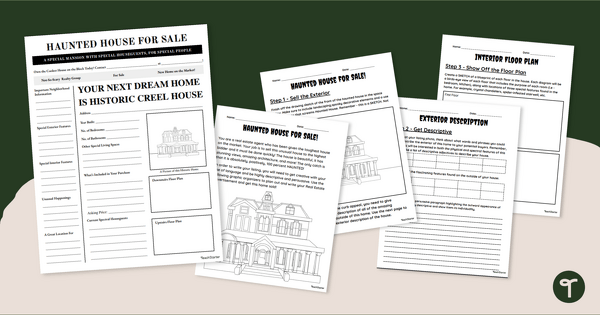
Haunted House for Sale - Creative Writing for 5th Grade
Use persuasive language and description writing to sell a haunted house with this exciting Halloween Haunted House Project!
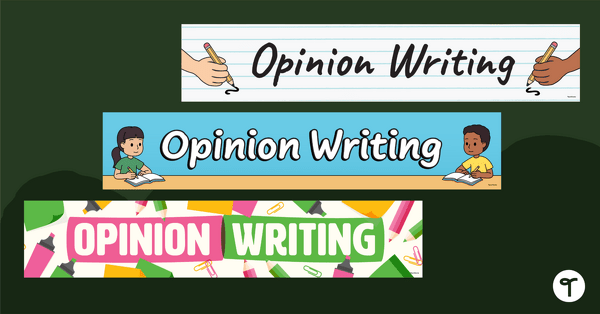
Free Opinion Writing Bulletin Board Banner
Create a fun persuasive writing classroom display with these fun looking display banners.
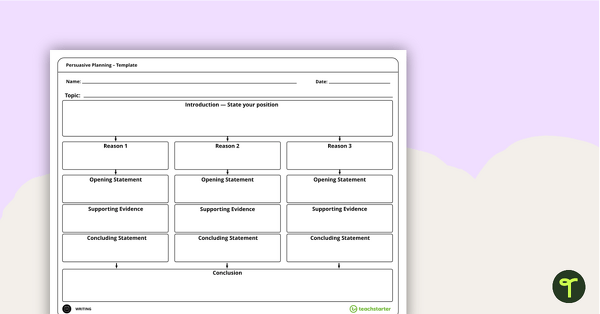
Persuasive Writing Planning Template
A planning template to use when writing a persuasive or opinion text.
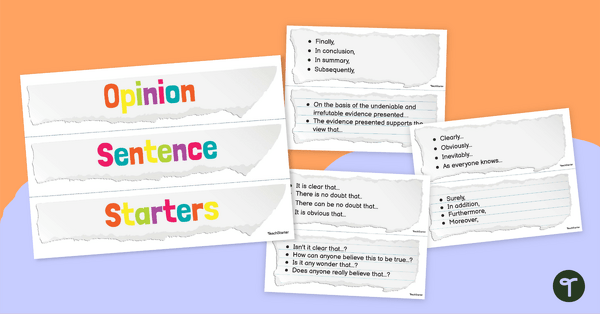
Opinion Sentence Starters Bulletin Display
Help your students begin their opinion writing with a strong sentence starter.
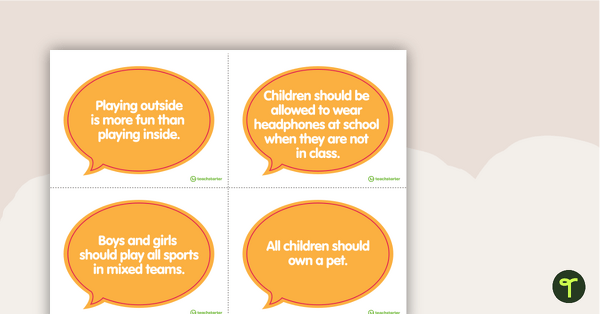
Opinion Prompt Cards – Set 1
Practice writing opinion or persuasive text with this set of 20 topic cards.
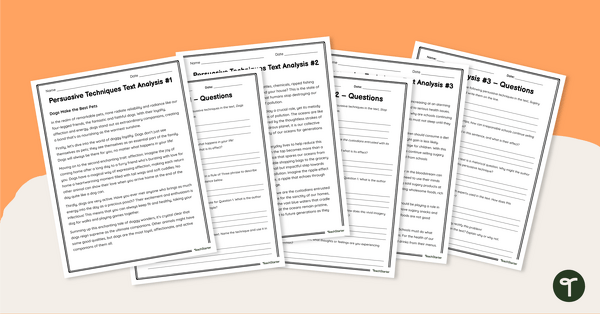
Analyzing Persuasive Techniques Worksheets
Get students analyzing persuasive techniques and their effects on audiences with this set of three texts with accompanying questions.
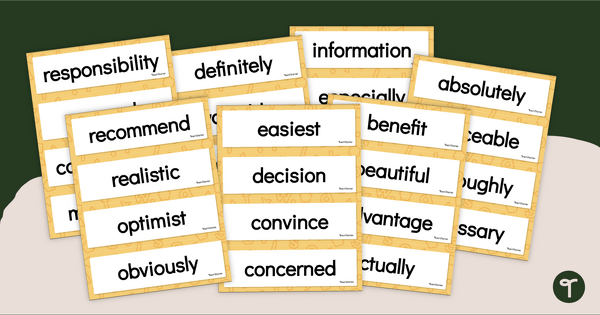
Persuasive Vocabulary Word Wall
Help your students enhance their persuasive writing skills with a set of 40 persuasive vocabulary word cards.
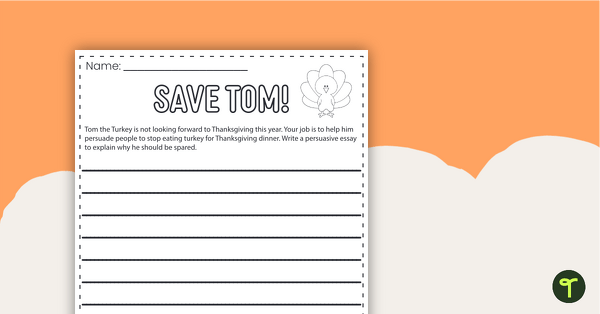
Save Tom - Disguise a Turkey Persuasive Writing Prompt
A fun Thanksgiving writing activity to use with your students.
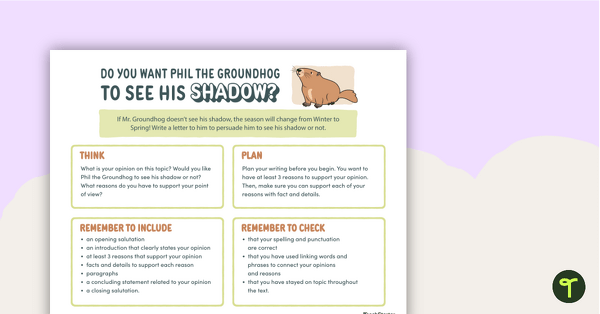
Persuasive Writing Activity - Dear Mr Groundhog
Write a letter to Mr. Groundhog about the weather using this persuasive writing worksheet.
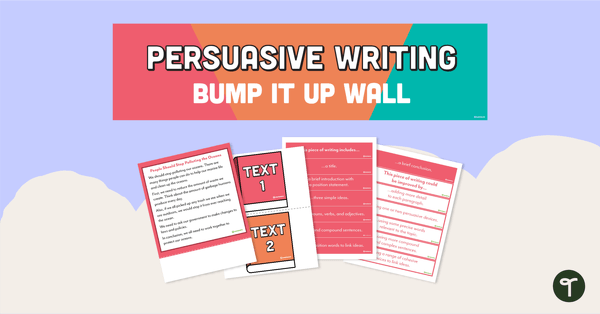
Persuasive Writing Bump It Up Wall – Grade 6
Help your 6th-grade students "bump up" their persuasive writing with this bulletin board display.
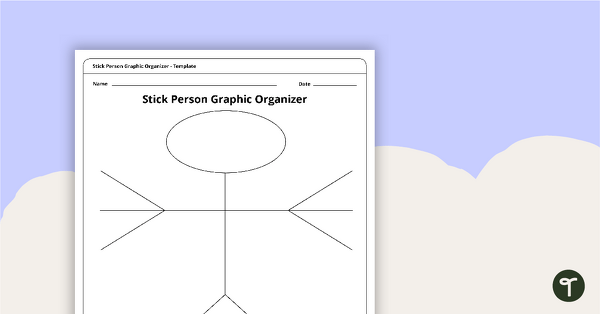
Stick Person Graphic Organizer
A simple and effective graphic organizer that can be used for a wide range of purposes including note taking, mind mapping, and planning writing responses.
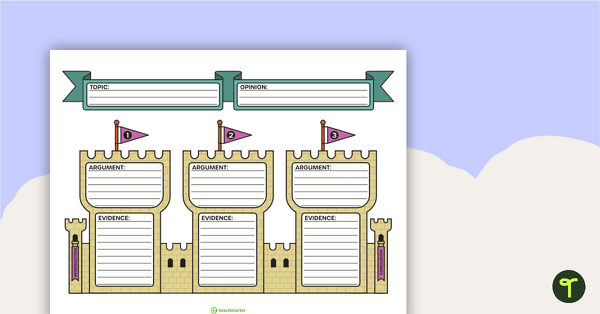
Persuasive Planning Template – Castle
Plan a persuasive text with this castle planning template.
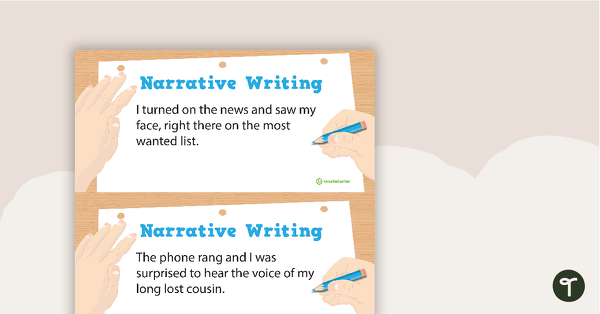
Topic Sentence Starter Cards
A pack of 32 narrative, persuasive, and report (informative) writing sentence starter cards.
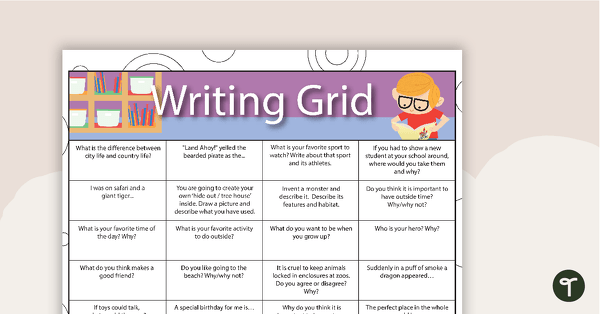
Assorted Writing Prompts Grid
A writing grid with 20 writing prompts.
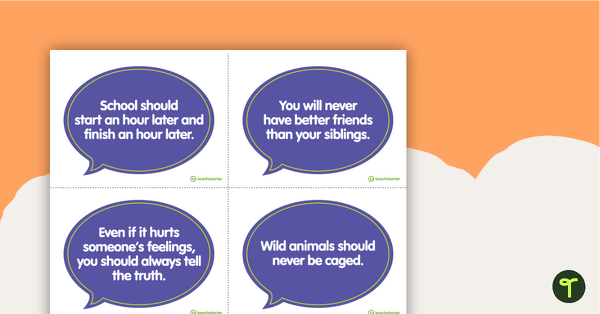
Opinion Prompt Cards – Set 2
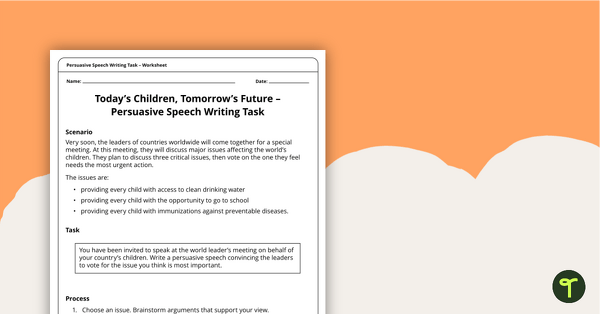
Persuasive Speech Writing Task
A persuasive writing task based on real-world issues affecting children.
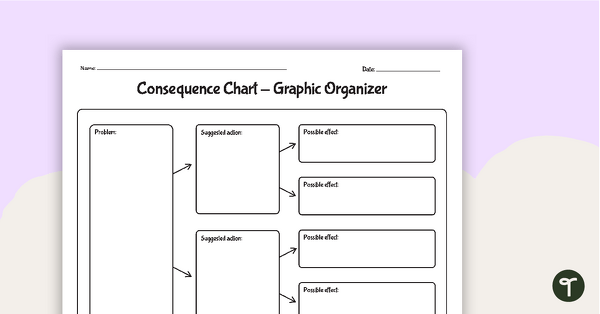
Consequence Chart - Graphic Organizer
A blank consequence chart to use when planning a persuasive text.
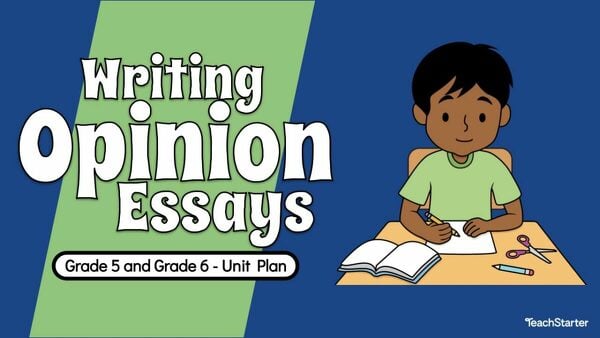
Writing an Opinion Piece Unit Plan - Grade 5 and Grade 6
This English unit addresses the genre of opinion writing; specifically, how to write an effective opinion piece.
- Persuasive Writing for 3rd Grade
- Persuasive Writing for 4th Grade
- Persuasive Writing for 5th Grade
How to Write a Persuasive Speech in the Sixth Grade
Soheila battaglia, 26 sep 2017.

Giving a speech can be scary to people of all ages, but giving a persuasive speech is not much different from participating in an argument. The goal of a persuasive speech is to sway the audience toward your viewpoint by giving reasons and details for your opinion. With organization and practice, anyone can write a strong persuasive speech.
Explore this article
Pick a topic that fits the guidelines of what your teacher has assigned. Sixth grade persuasive topics might include issues such as curfews, year-round schooling, littering, bullying, school uniforms, gangs, sex education, arts in schools, animal rights and violent video games. The topic should be an issue that affects people and about which people can have different opinions. You should pick a topic that you find interesting and about which you have something to say.
2 Main Point
Once you've picked a topic, you need to decide where you stand on the issue. You can argue for it or against it, or you can propose a solution. Clearly state your main point at the start of your speech. It should also be debatable and not a fact; this means others should be able to disagree with your statement. For example, if the topic is violent video games, you can argue that violent video games should be banned because they lead to real violence in society; an opposing position to this claim could be that video games, no matter how violent, should not be censored because this would limit people's freedoms. It helps if the main point is something you really believe, because that makes it easier to come up with reasons to support it.
3 Structure
The speech should have an introduction, a body and a conclusion. The introduction should provide background and state what you are trying to persuade the audience about. The body should give reasons, details and examples that support your point. For example, if your main point is that school uniforms are a bad idea for students, you can explain that uniforms restrict the students' right to self-expression and that making girls wear skirts while boys can wear pants is not fair to girls. Finally, the conclusion of your speech should restate your major points.
Don't wait until the last minute to write your speech. Write it early enough that you will have sufficient time to rehearse and revise it. Practicing the speech can give you a sense of time so you know how to pace yourself in your delivery. Also, practicing the speech by reading it aloud several times increases your familiarity with it, which can reduce stress about forgetting or stumbling. Practice in front of people to get comfortable with speaking in front of an audience and to get helpful feedback to make the speech more clear and interesting.
- 1 University of Arkansas: Persuasive and Controversial Speech Ideas
About the Author
Soheila Battaglia is a published and award-winning author and filmmaker. She holds an MA in literary cultures from New York University and a BA in ethnic studies from UC Berkeley. She is a college professor of literature and composition.
Related Articles

Topics for Persuasive Speeches on Volunteering

How to Write a Conclusion to a Speech

College-Level Persuasive Essay Topics

Speech Topics on Cheerleading

How to Give a Good 8th-Grade Speech

How to Write a Discursive Essay

How to Give a Speech on Animal Cruelty

Examples of Political Issues

How to Write an Argumentative Speech

Good Persuasive Topics on Health

Advocacy Speech Topics

Topics for a Satirical Paper

How Does the Constitution Protect Freedom of Expression?

What Is a Commonly Held Ideal of American Political...

The Best Speech Topics for Kids

Health-Related Persuasive Speech Topics

How to Write a Speech for the Fourth Grade Student...

How to Write a Good Speech

How to Write a Negative Debate Speech

Persuasive Speech Topics on Music
Regardless of how old we are, we never stop learning. Classroom is the educational resource for people of all ages. Whether you’re studying times tables or applying to college, Classroom has the answers.
- Accessibility
- Terms of Use
- Privacy Policy
- Copyright Policy
- Manage Preferences
© 2020 Leaf Group Ltd. / Leaf Group Media, All Rights Reserved. Based on the Word Net lexical database for the English Language. See disclaimer .
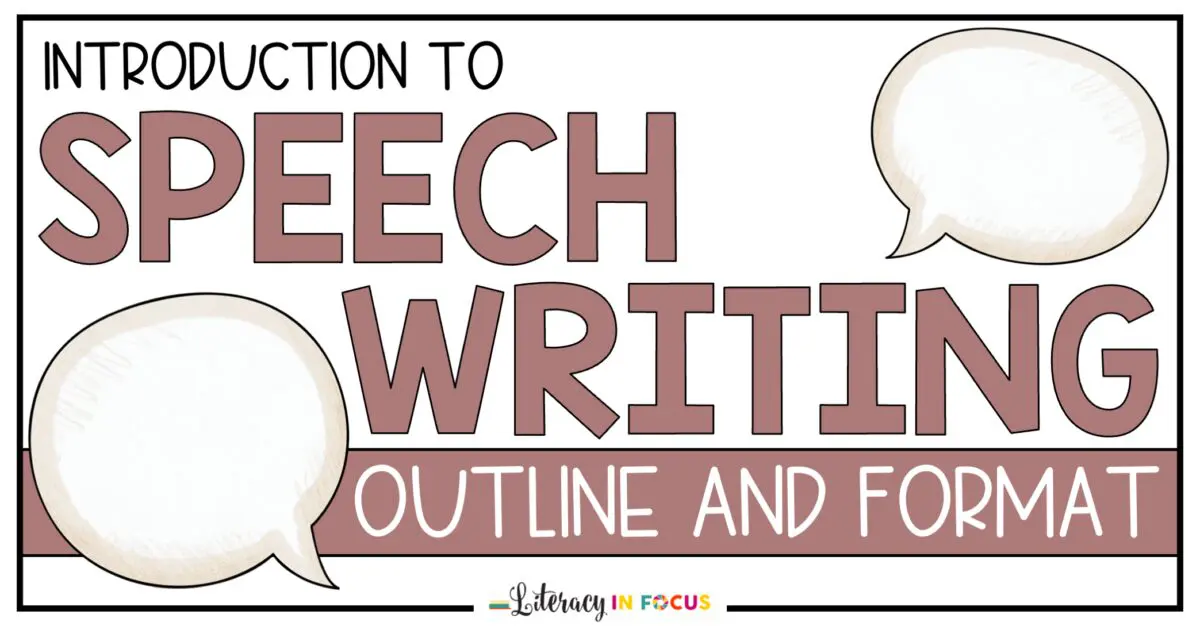
Speech Writing Outline and Format for Students
Learning how to write a speech is a skill most students will need help refining. Guide your students through the speech writing process with the outline and descriptions below. All of the major components of a speech are included and explained in a format students can understand and apply. Once students understand the step-by-step method for crafting a successful speech, they will feel more confident speaking in front of an audience.
I. Introduction
The beginning of a speech is called the introduction. The introduction is important because it sets the tone for the entire presentation. The introduction can be broken into two parts: the attention grabber and the preview.
A. Attention Grabber: Capturing the attention of the audience is the first thing the speaker says or does. In order to do this, the speaker might tell a humorous story, ask a rhetorical question, describe a hypothetical situation, or share an interesting fact.
B. Preview: The second part of the introduction is when the speaker introduces himself or herself and the topic of the speech. The main points of the speech can also be presented at this time.
II. Body
After the introduction, the speaker transitions to the body of the speech. This is where the speaker will spend the most amount of time. The goal of the body of the speech is to clearly explain the topic.
A. Main Points: To clearly explain the topic, the body of the speech is broken down into main points. The number of main points will vary from speech to speech. Regardless of the number, it is important to keep the main points organized in a purposeful way. Also, clear transitions between main points (and throughout the speech) are critical. Without them, the audience will have trouble following along.
1. Supporting Details: Each main point needs supporting material to help the audience understand and remember that point. Examples, explanations, visual aids, and props can be used as supporting material.

III. Conclusion
The conclusion puts the finishing touches on the speech. It lets the audience know that the speech is about to end. Like the introduction, the conclusion can be broken into two parts: the review and the final statement.
A. Review: During the first part of the conclusion, the speaker restates the topic of the speech and each main point.
B. Final Statement: The speech ends with a strong final statement. The final statement addresses the topic one last time in a powerful and meaningful way. The purpose of the final statement is to round out the speech and provide the audience with a strong signal that the presentation is complete.
Click here to download everything you need to teach your students how to write an organized speech. The comprehensive lesson includes “How to Write a Speech” informational text, comprehension questions, example speech, speech outline template, speech writing rubric, and a list of 40 student-friendly speech topics.
Speech Writing Lesson Bundle
“This was an excellent way to begin the year in my speech class. It was very informative for students, had a fun appearance, and was easy to follow. I know I will use this every semester! Thank you!” -Kim O.
Students LOVE this microphone!
This wireless Bluetooth microphone is perfect for student presentations, read alouds, speeches, and so much more! The microphone has 27 colorful LED lights that flicker in rhythm with the voice. You can also use this wireless microphone as a portable Bluetooth speaker. It’s available in a bunch of different colors, and it comes with a nice storage case.
⭐️⭐️⭐️⭐️⭐️ Over 18,000 ratings on Amazon!
“The kids loved this! I think it encouraged them to try to talk more!”
This post contains affiliate links. Click here to read my affiliate policy .
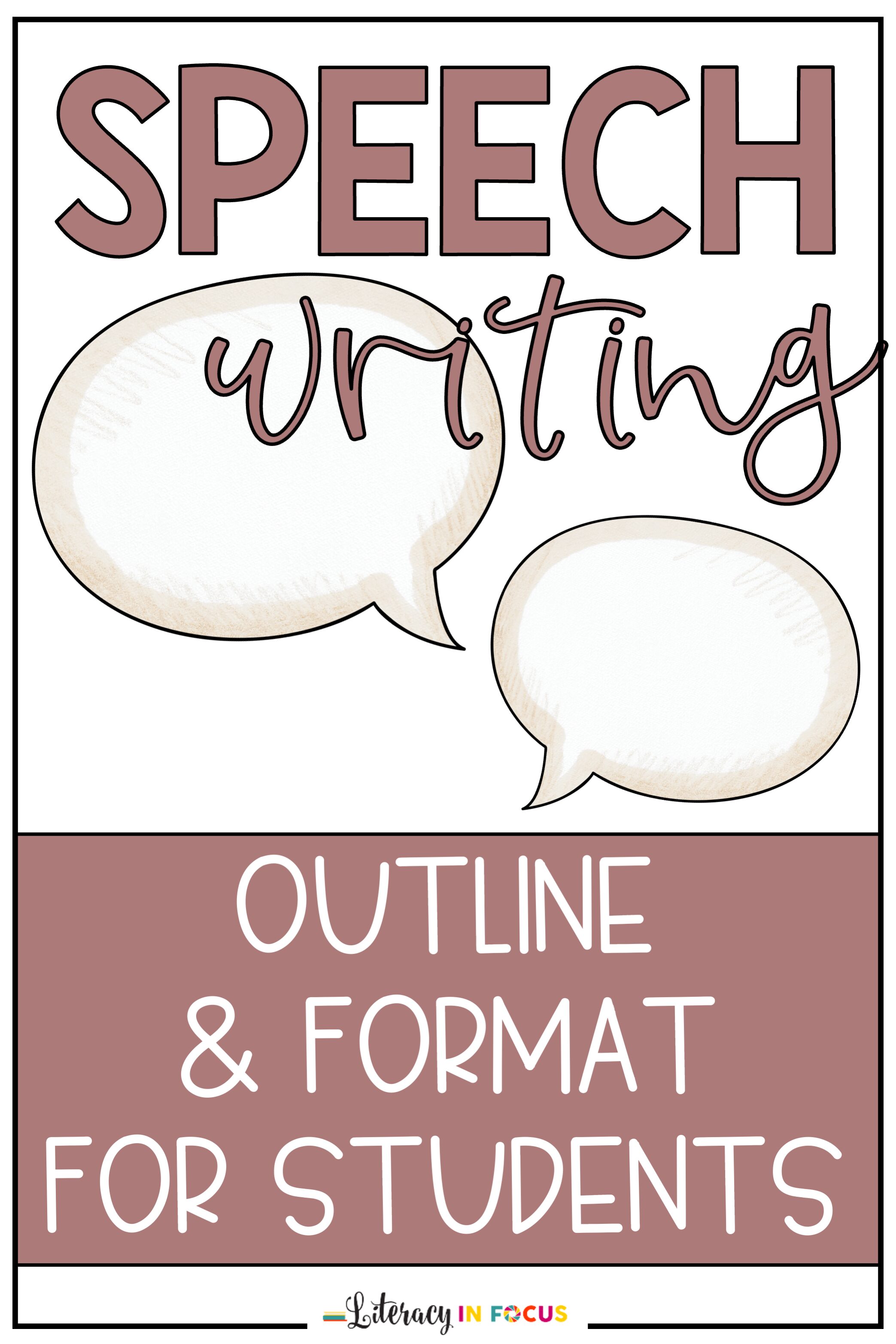
- Games, topic printables & more
- The 4 main speech types
- Example speeches
- Commemorative
- Declamation
- Demonstration
- Informative
- Introduction
- Student Council
- Speech topics
- Poems to read aloud
- How to write a speech
- Using props/visual aids
- Acute anxiety help
- Breathing exercises
- Letting go - free e-course
- Using self-hypnosis
- Delivery overview
- 4 modes of delivery
- How to make cue cards
- How to read a speech
- 9 vocal aspects
- Vocal variety
- Diction/articulation
- Pronunciation
- Speaking rate
- How to use pauses
- Eye contact
- Body language
- Voice image
- Voice health
- Public speaking activities and games
- Blogging Aloud
- About me/contact
How to write a good speech in 7 steps
By: Susan Dugdale
- an easily followed format for writing a great speech
Did you know writing a speech doesn't have be an anxious, nail biting experience?
Unsure? Don't be.
You may have lived with the idea you were never good with words for a long time. Or perhaps giving speeches at school brought you out in cold sweats.
However learning how to write a speech is relatively straight forward when you learn to write out loud.
And that's the journey I am offering to take you on: step by step.
To learn quickly, go slow
Take all the time you need. This speech writing format has 7 steps, each building on the next.
Walk, rather than run, your way through all of them. Don't be tempted to rush. Familiarize yourself with the ideas. Try them out.
I know there are well-advertised short cuts and promises of 'write a speech in 5 minutes'. However in reality they only truly work for somebody who already has the basic foundations of speech writing in place.
The foundation of good speech writing
These steps are the backbone of sound speech preparation. Learn and follow them well at the outset and yes, given more experience and practice you could probably flick something together quickly. Like any skill, the more it's used, the easier it gets.
In the meantime...
Step 1: Begin with a speech overview or outline
Are you in a hurry? Without time to read a whole page? Grab ... The Quick How to Write a Speech Checklist And come back to get the details later.
- WHO you are writing your speech for (your target audience)
- WHY you are preparing this speech. What's the main purpose of your speech? Is it to inform or tell your audience about something? To teach them a new skill or demonstrate something? To persuade or to entertain? (See 4 types of speeches: informative, demonstrative, persuasive and special occasion or entertaining for more.) What do you want them to think, feel or do as a result of listening the speech?
- WHAT your speech is going to be about (its topic) - You'll want to have thought through your main points and have ranked them in order of importance. And have sorted the supporting research you need to make those points effectively.
- HOW much time you have for your speech eg. 3 minutes, 5 minutes... The amount of time you've been allocated dictates how much content you need. If you're unsure check this page: how many words per minute in a speech: a quick reference guide . You'll find estimates of the number of words required for 1 - 10 minute speeches by slow, medium and fast talkers.
Use an outline
The best way to make sure you deliver an effective speech is to start by carefully completing a speech outline covering the essentials: WHO, WHY, WHAT and HOW.
Beginning to write without thinking your speech through is a bit like heading off on a journey not knowing why you're traveling or where you're going to end up. You can find yourself lost in a deep, dark, murky muddle of ideas very quickly!
Pulling together a speech overview or outline is a much safer option. It's the map you'll follow to get where you want to go.
Get a blank speech outline template to complete
Click the link to find out a whole lot more about preparing a speech outline . ☺ You'll also find a free printable blank speech outline template. I recommend using it!
Understanding speech construction
Before you begin to write, using your completed outline as a guide, let's briefly look at what you're aiming to prepare.
- an opening or introduction
- the body where the bulk of the information is given
- and an ending (or summary).
Imagine your speech as a sandwich
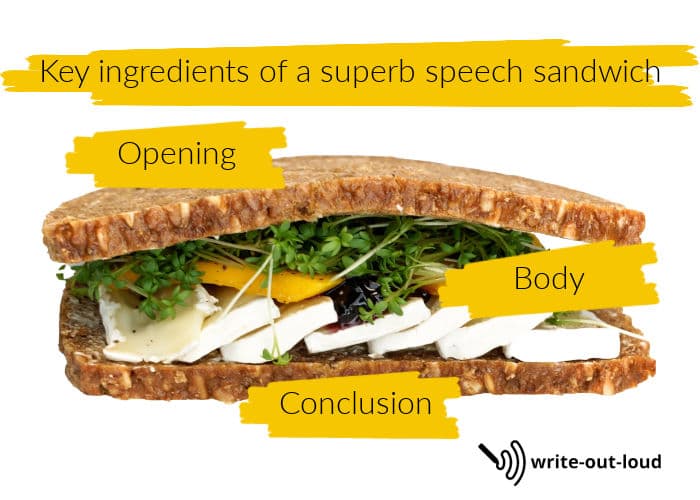
If you think of a speech as a sandwich you'll get the idea.
The opening and ending are the slices of bread holding the filling (the major points or the body of your speech) together.
You can build yourself a simple sandwich with one filling (one big idea) or you could go gourmet and add up to three or, even five. The choice is yours.
But whatever you choose to serve, as a good cook, you need to consider who is going to eat it! And that's your audience.
So let's find out who they are before we do anything else.
Step 2: Know who you are talking to
Understanding your audience.
Did you know a good speech is never written from the speaker's point of view? ( If you need to know more about why check out this page on building rapport .)
Begin with the most important idea/point on your outline.
Consider HOW you can explain (show, tell) that to your audience in the most effective way for them to easily understand it.
Writing from the audience's point of view

To help you write from an audience point of view, it's a good idea to identify either a real person or the type of person who is most likely to be listening to you.
Make sure you select someone who represents the "majority" of the people who will be in your audience. That is they are neither struggling to comprehend you at the bottom of your scale or light-years ahead at the top.
Now imagine they are sitting next to you eagerly waiting to hear what you're going to say. Give them a name, for example, Joe, to help make them real.
Ask yourself
- How do I need to tailor my information to meet Joe's needs? For example, do you tell personal stories to illustrate your main points? Absolutely! Yes. This is a very powerful technique. (Click storytelling in speeches to find out more.)
- What type or level of language is right for Joe as well as my topic? For example, if I use jargon (activity, industry or profession specific vocabulary) will it be understood?
Step 3: Writing as you speak
Writing oral language.
Write down what you want to say about your first main point as if you were talking directly to Joe.
If it helps, say it all out loud before you write it down and/or record it.
Use the information below as a guide
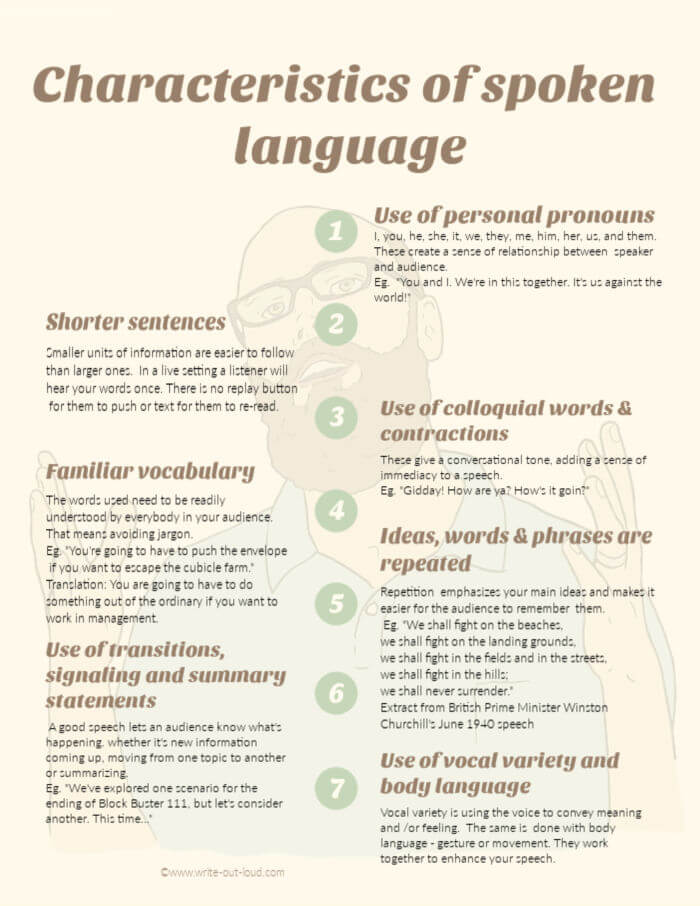
(Click to download The Characteristics of Spoken Language as a pdf.)
You do not have to write absolutely everything you're going to say down * but you do need to write down, or outline, the sequence of ideas to ensure they are logical and easily followed.
Remember too, to explain or illustrate your point with examples from your research.
( * Tip: If this is your first speech the safety net of having everything written down could be just what you need. It's easier to recover from a patch of jitters when you have a word by word manuscript than if you have either none, or a bare outline. Your call!)
Step 4: Checking tone and language
The focus of this step is re-working what you've done in Step 2 and 3.
You identified who you were talking to (Step 2) and in Step 3, wrote up your first main point. Is it right? Have you made yourself clear? Check it.
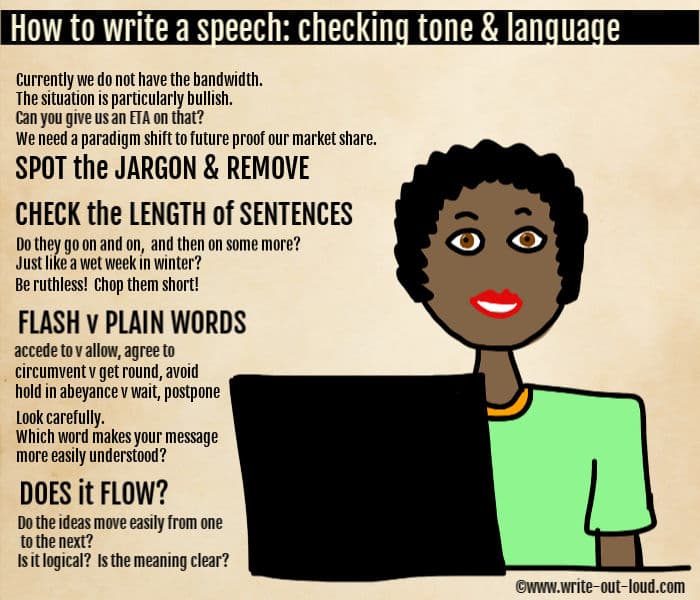
How well you complete this step depends on how well you understand the needs of the people who are going to listen to your speech.
Please do not assume because you know what you're talking about the person (Joe) you've chosen to represent your audience will too. Joe is not a mind-reader!
How to check what you've prepared
- Check the "tone" of your language . Is it right for the occasion, subject matter and your audience?
- Check the length of your sentences. You need short sentences. If they're too long or complicated you risk losing your listeners.
Check for jargon too. These are industry, activity or group exclusive words.
For instance take the phrase: authentic learning . This comes from teaching and refers to connecting lessons to the daily life of students. Authentic learning is learning that is relevant and meaningful for students. If you're not a teacher you may not understand the phrase.
The use of any vocabulary requiring insider knowledge needs to be thought through from the audience perspective. Jargon can close people out.
- Read what you've written out loud. If it flows naturally, in a logical manner, continue the process with your next main idea. If it doesn't, rework.
We use whole sentences and part ones, and we mix them up with asides or appeals e.g. "Did you get that? Of course you did. Right...Let's move it along. I was saying ..."
Click for more about the differences between spoken and written language .
And now repeat the process
Repeat this process for the remainder of your main ideas.
Because you've done the first one carefully, the rest should follow fairly easily.
Step 5: Use transitions
Providing links or transitions between main ideas.
Between each of your main ideas you need to provide a bridge or pathway for your audience. The clearer the pathway or bridge, the easier it is for them to make the transition from one idea to the next.

If your speech contains more than three main ideas and each is building on the last, then consider using a "catch-up" or summary as part of your transitions.
Is your speech being evaluated? Find out exactly what aspects you're being assessed on using this standard speech evaluation form
Link/transition examples
A link can be as simple as:
"We've explored one scenario for the ending of Block Buster 111, but let's consider another. This time..."
What follows this transition is the introduction of Main Idea Two.
Here's a summarizing link/transition example:
"We've ended Blockbuster 111 four ways so far. In the first, everybody died. In the second, everybody died BUT their ghosts remained to haunt the area. In the third, one villain died. His partner reformed and after a fight-out with the hero, they both strode off into the sunset, friends forever. In the fourth, the hero dies in a major battle but is reborn sometime in the future.
And now what about one more? What if nobody died? The fifth possibility..."
Go back through your main ideas checking the links. Remember Joe as you go. Try each transition or link out loud and really listen to yourself. Is it obvious? Easily followed?
Keep them if they are clear and concise.
For more about transitions (with examples) see Andrew Dlugan's excellent article, Speech Transitions: Magical words and Phrases .
Step 6: The end of your speech
The ideal ending is highly memorable . You want it to live on in the minds of your listeners long after your speech is finished. Often it combines a call to action with a summary of major points.

Example speech endings
Example 1: The desired outcome of a speech persuading people to vote for you in an upcoming election is that they get out there on voting day and do so. You can help that outcome along by calling them to register their support by signing a prepared pledge statement as they leave.
"We're agreed we want change. You can help us give it to you by signing this pledge statement as you leave. Be part of the change you want to see!
Example 2: The desired outcome is increased sales figures. The call to action is made urgent with the introduction of time specific incentives.
"You have three weeks from the time you leave this hall to make that dream family holiday in New Zealand yours. Can you do it? Will you do it? The kids will love it. Your wife will love it. Do it now!"
How to figure out the right call to action
A clue for working out what the most appropriate call to action might be, is to go back to your original purpose for giving the speech.
- Was it to motivate or inspire?
- Was it to persuade to a particular point of view?
- Was it to share specialist information?
- Was it to celebrate a person, a place, time or event?
Ask yourself what you want people to do as a result of having listened to your speech.
For more about ending speeches
Visit this page for more about how to end a speech effectively . You'll find two additional types of speech endings with examples.
Write and test
Write your ending and test it out loud. Try it out on a friend, or two. Is it good? Does it work?
Step 7: The introduction
Once you've got the filling (main ideas) the linking and the ending in place, it's time to focus on the introduction.
The introduction comes last as it's the most important part of your speech. This is the bit that either has people sitting up alert or slumped and waiting for you to end. It's the tone setter!
What makes a great speech opening?
Ideally you want an opening that makes listening to you the only thing the 'Joes' in the audience want to do.
You want them to forget they're hungry or that their chair is hard or that their bills need paying.
The way to do that is to capture their interest straight away. You do this with a "hook".
Hooks to catch your audience's attention
Hooks come in as many forms as there are speeches and audiences. Your task is work out what specific hook is needed to catch your audience.
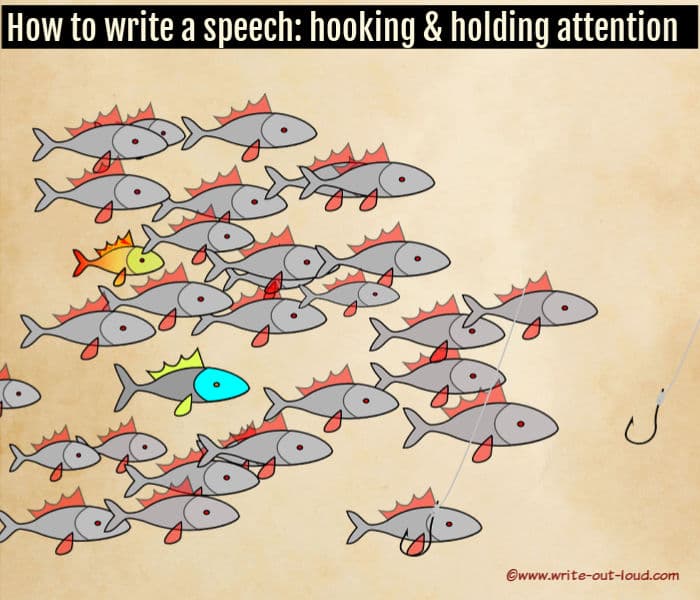
Go back to the purpose. Why are you giving this speech?
Once you have your answer, consider your call to action. What do you want the audience to do, and, or take away, as a result of listening to you?
Next think about the imaginary or real person you wrote for when you were focusing on your main ideas.
Choosing the best hook
- Is it humor?
- Would shock tactics work?
- Is it a rhetorical question?
- Is it formality or informality?
- Is it an outline or overview of what you're going to cover, including the call to action?
- Or is it a mix of all these elements?
A hook example
Here's an example from a fictional political speech. The speaker is lobbying for votes. His audience are predominately workers whose future's are not secure.
"How's your imagination this morning? Good? (Pause for response from audience) Great, I'm glad. Because we're going to put it to work starting right now.
I want you to see your future. What does it look like? Are you happy? Is everything as you want it to be? No? Let's change that. We could do it. And we could do it today.
At the end of this speech you're going to be given the opportunity to change your world, for a better one ...
No, I'm not a magician. Or a simpleton with big ideas and precious little commonsense. I'm an ordinary man, just like you. And I have a plan to share!"
And then our speaker is off into his main points supported by examples. The end, which he has already foreshadowed in his opening, is the call to vote for him.
Prepare several hooks
Experiment with several openings until you've found the one that serves your audience, your subject matter and your purpose best.
For many more examples of speech openings go to: how to write a speech introduction . You'll find 12 of the very best ways to start a speech.
That completes the initial seven steps towards writing your speech. If you've followed them all the way through, congratulations, you now have the text of your speech!
Although you might have the words, you're still a couple of steps away from being ready to deliver them. Both of them are essential if you want the very best outcome possible. They are below. Please take them.
Step 8: Checking content and timing
This step pulls everything together.
Check once, check twice, check three times & then once more!
Go through your speech really carefully.
On the first read through check you've got your main points in their correct order with supporting material, plus an effective introduction and ending.
On the second read through check the linking passages or transitions making sure they are clear and easily followed.
On the third reading check your sentence structure, language use and tone.
Double, triple check the timing
Now go though once more.
This time read it aloud slowly and time yourself.
If it's too long for the time allowance you've been given make the necessary cuts.
Start by looking at your examples rather than the main ideas themselves. If you've used several examples to illustrate one principal idea, cut the least important out.
Also look to see if you've repeated yourself unnecessarily or, gone off track. If it's not relevant, cut it.
Repeat the process, condensing until your speech fits the required length, preferably coming in just under your time limit.
You can also find out how approximately long it will take you to say the words you have by using this very handy words to minutes converter . It's an excellent tool, one I frequently use. While it can't give you a precise time, it does provide a reasonable estimate.

Step 9: Rehearsing your speech
And NOW you are finished with writing the speech, and are ready for REHEARSAL .

Please don't be tempted to skip this step. It is not an extra thrown in for good measure. It's essential.
The "not-so-secret" secret of successful speeches combines good writing with practice, practice and then, practicing some more.
Go to how to practice public speaking and you'll find rehearsal techniques and suggestions to boost your speech delivery from ordinary to extraordinary.
The Quick How to Write a Speech Checklist
Before you begin writing you need:.
- Your speech OUTLINE with your main ideas ranked in the order you're going to present them. (If you haven't done one complete this 4 step sample speech outline . It will make the writing process much easier.)
- Your RESEARCH
- You also need to know WHO you're speaking to, the PURPOSE of the speech and HOW long you're speaking for
The basic format
- the body where you present your main ideas
Split your time allowance so that you spend approximately 70% on the body and 15% each on the introduction and ending.
How to write the speech
- Write your main ideas out incorporating your examples and research
- Link them together making sure each flows in a smooth, logical progression
- Write your ending, summarizing your main ideas briefly and end with a call for action
- Write your introduction considering the 'hook' you're going to use to get your audience listening
- An often quoted saying to explain the process is: Tell them what you're going to tell them (Introduction) Tell them (Body of your speech - the main ideas plus examples) Tell them what you told them (The ending)
TEST before presenting. Read aloud several times to check the flow of material, the suitability of language and the timing.

- Return to top
speaking out loud
Subscribe for FREE weekly alerts about what's new For more see speaking out loud

Top 10 popular pages
- Welcome speech
- Demonstration speech topics
- Impromptu speech topic cards
- Thank you quotes
- Impromptu public speaking topics
- Farewell speeches
- Phrases for welcome speeches
- Student council speeches
- Free sample eulogies
From fear to fun in 28 ways
A complete one stop resource to scuttle fear in the best of all possible ways - with laughter.

Useful pages
- Search this site
- About me & Contact
- Free e-course
- Privacy policy
©Copyright 2006-24 www.write-out-loud.com
Designed and built by Clickstream Designs
- Speech Topics For Kids
- How To Write A Speech
How to Write a Speech: A Guide to Enhance Your Writing Skills
Speech is a medium to convey a message to the world. It is a way of expressing your views on a topic or a way to showcase your strong opposition to a particular idea. To deliver an effective speech, you need a strong and commanding voice, but more important than that is what you say. Spending time in preparing a speech is as vital as presenting it well to your audience.
Read the article to learn what all you need to include in a speech and how to structure it.
Table of Contents
- Self-Introduction
The Opening Statement
Structuring the speech, choice of words, authenticity, writing in 1st person, tips to write a speech, frequently asked questions on speech, how to write a speech.
Writing a speech on any particular topic requires a lot of research. It also has to be structured well in order to properly get the message across to the target audience. If you have ever listened to famous orators, you would have noticed the kind of details they include when speaking about a particular topic, how they present it and how their speeches motivate and instill courage in people to work towards an individual or shared goal. Learning how to write such effective speeches can be done with a little guidance. So, here are a few points you can keep in mind when writing a speech on your own. Go through each of them carefully and follow them meticulously.
Self Introduction
When you are writing or delivering a speech, the very first thing you need to do is introduce yourself. When you are delivering a speech for a particular occasion, there might be a master of ceremony who might introduce you and invite you to share your thoughts. Whatever be the case, always remember to say one or two sentences about who you are and what you intend to do.
Introductions can change according to the nature of your target audience. It can be either formal or informal based on the audience you are addressing. Here are a few examples.
Addressing Friends/Classmates/Peers
- Hello everyone! I am ________. I am here to share my views on _________.
- Good morning friends. I, _________, am here to talk to you about _________.
Addressing Teachers/Higher Authorities
- Good morning/afternoon/evening. Before I start, I would like to thank _______ for giving me an opportunity to share my thoughts about ________ here today.
- A good day to all. I, __________, on behalf of _________, am standing here today to voice out my thoughts on _________.
It is said that the first seven seconds is all that a human brain requires to decide whether or not to focus on something. So, it is evident that a catchy opening statement is the factor that will impact your audience. Writing a speech does require a lot of research, and structuring it in an interesting, informative and coherent manner is something that should be done with utmost care.
When given a topic to speak on, the first thing you can do is brainstorm ideas and pen down all that comes to your mind. This will help you understand what aspect of the topic you want to focus on. With that in mind, you can start drafting your speech.
An opening statement can be anything that is relevant to the topic. Use words smartly to create an impression and grab the attention of your audience. A few ideas on framing opening statements are given below. Take a look.
- Asking an Engaging Question
Starting your speech by asking the audience a question can get their attention. It creates an interest and curiosity in the audience and makes them think about the question. This way, you would have already got their minds ready to listen and think.
- Fact or a Surprising Statement
Surprising the audience with an interesting fact or a statement can draw the attention of the audience. It can even be a joke; just make sure it is relevant. A good laugh would wake up their minds and they would want to listen to what you are going to say next.
- Adding a Quote
After you have found your topic to work on, look for a quote that best suits your topic. The quote can be one said by some famous personality or even from stories, movies or series. As long as it suits your topic and is appropriate to the target audience, use them confidently. Again, finding a quote that is well-known or has scope for deep thought will be your success factor.
To structure your speech easily, it is advisable to break it into three parts or three sections – an introduction, body and conclusion.
- Introduction: Introduce the topic and your views on the topic briefly.
- Body: Give a detailed explanation of your topic. Your focus should be to inform and educate your audience on the said topic.
- Conclusion: Voice out your thoughts/suggestions. Your intention here should be to make them think/act.
While delivering or writing a speech, it is essential to keep an eye on the language you are using. Choose the right kind of words. The person has the liberty to express their views in support or against the topic; just be sure to provide enough evidence to prove the discussed points. See to it that you use short and precise sentences. Your choice of words and what you emphasise on will decide the effect of the speech on the audience.
When writing a speech, make sure to,
- Avoid long, confusing sentences.
- Check the spelling, sentence structure and grammar.
- Not use contradictory words or statements that might cause any sort of issues.
Anything authentic will appeal to the audience, so including anecdotes, personal experiences and thoughts will help you build a good rapport with your audience. The only thing you need to take care is to not let yourself be carried away in the moment. Speak only what is necessary.
Using the 1st person point of view in a speech is believed to be more effective than a third person point of view. Just be careful not to make it too subjective and sway away from the topic.
- Understand the purpose of your speech: Before writing the speech, you must understand the topic and the purpose behind it. Reason out and evaluate if the speech has to be inspiring, entertaining or purely informative.
- Identify your audience: When writing or delivering a speech, your audience play the major role. Unless you know who your target audience is, you will not be able to draft a good and appropriate speech.
- Decide the length of the speech: Whatever be the topic, make sure you keep it short and to the point. Making a speech longer than it needs to be will only make it monotonous and boring.
- Revising and practicing the speech: After writing, it is essential to revise and recheck as there might be minor errors which you might have missed. Edit and revise until you are sure you have it right. Practise as much as required so you do not stammer in front of your audience.
- Mention your takeaways at the end of the speech: Takeaways are the points which have been majorly emphasised on and can bring a change. Be sure to always have a thought or idea that your audience can reflect upon at the end of your speech.
How to write a speech?
Writing a speech is basically about collecting, summarising and structuring your points on a given topic. Do a proper research, prepare multiple drafts, edit and revise until you are sure of the content.
Why is it important to introduce ourselves?
It is essential to introduce yourself while writing a speech, so that your audience or the readers know who the speaker is and understand where you come from. This will, in turn, help them connect with you and your thoughts.
| ENGLISH Related Links | |
Leave a Comment Cancel reply
Your Mobile number and Email id will not be published. Required fields are marked *
Request OTP on Voice Call
Post My Comment
Register with BYJU'S & Download Free PDFs
Register with byju's & watch live videos.

Speech Writing Format, Tips and Examples

Table of Contents
Speech Writing : Speech writing is a skill that can empower you to convey your thoughts, inspire others, and leave a lasting impact. Whether you’re preparing a speech for a school , a business meeting, or a special occasion, knowing how to craft an effective speech is invaluable. In this blog, we’ll explore what makes good speech writing, the structure of a speech, and the eight essential steps to ensure your speech resonates with your audience. Let’s dive into the world of successful speech writing Class 11 !
Fill Out the Form for Expert Academic Guidance!
Please indicate your interest Live Classes Books Test Series Self Learning
Verify OTP Code (required)
I agree to the terms and conditions and privacy policy .
Fill complete details
Target Exam ---
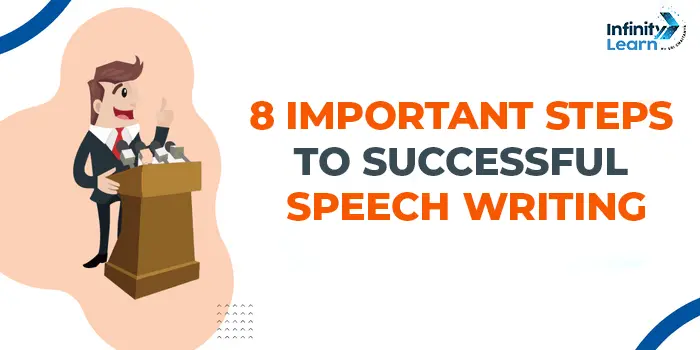
What is Good Speech Writing?
Good speech writing refers to the skillful art of starting a speech that effectively communicates a message, engages the audience, and leaves a lasting impact. Deliver an impactful and inspiring speech on success , unveiling the keys to achievement and empowerment that captivate your audience.” A well-written speech is characterized by several key elements:
Clarity: A good speech is clear and easy to understand. It conveys the message in a straightforward manner, avoiding unnecessary jargon or complexity.
Relevance: It is tailored to the audience’s needs and interests. A good speech addresses the concerns and expectations of the audience, making it relatable and engaging.
Structure: A well-structured speech has a clear beginning, middle, and end. It follows a logical flow, with each section building upon the previous one.
Engagement: Good speech writing captures the audience’s attention from the start and maintains it throughout the speech. It uses effective hooks, anecdotes, and rhetorical devices to engage the audience emotionally and intellectually.
Content: The content of a good speech is well-researched and supported by credible evidence, facts, examples, and anecdotes. It provides valuable information or conveys a persuasive argument.
Delivery: While speech writing focuses on the text, good delivery speech is essential for effective communication. A well-written speech is delivered with confidence, appropriate tone, and proper pacing.
Memorability: A good speech leaves a lasting impression on the audience. It may include memorable quotes, stories, or calls to action that resonate with listeners.
Purpose: The purpose of the speech is clearly defined, whether it’s to inform, persuade, inspire, entertain, or a combination of these objectives. The speech aligns with its intended purpose.
Connection: It establishes a connection with the audience by addressing their concerns, values, and emotions. A good speech can make the audience feel heard and understood.
Impact: Ultimately, good speech writing aims to have an impact. It may lead to changed perspectives, inspired actions, or a deeper understanding of the topic.
How to Start a Speech in English
The opening of a speech is the gateway to engaging an audience. Begin by captivating attention with a compelling question, a captivating story, or an intriguing fact. A well-chosen quote or a vivid scene can also stir curiosity and set the tone for what’s to come. The key lies in drawing listeners in, making them eager to journey through the words you’re about to share. An impactful start sets the stage for a memorable and engaging speech. Speech writing class 11: Where words become powerful tools and students learn to articulate their thoughts with confidence and eloquence.

Structure of a Good Speech Writing
The speech writing class 11 format plays a crucial role in organizing and delivering your message effectively. A well-structured speech typically consists of three main parts:
Introduction
Hook: Begin with a compelling opening that grabs your audience’s attention. This could be a question, a quote, a startling fact, or a personal anecdote related to your topic.
Purpose Statement: Clearly state the purpose of your speech. Let your audience know what you aim to achieve or convey.
Preview: Provide a brief overview of the main points or topics you will cover in your speech. This gives your audience a roadmap of what to expect.
Body: Main Points: Organize your speech into two or more main points or sections, each addressing a specific aspect of your topic. These main points should be related and support your overall message.
Supporting Material: Within each main point, include supporting evidence, examples, statistics, anecdotes, or arguments that reinforce your message.
Transitions: Use transitional phrases or sentences to smoothly move from one main point to the next. Transitions help maintain the flow of your speech.

Summary: Summarize the key points you’ve discussed in the body of your speech. Restate your purpose and message to reinforce them.
Closing Statement: End your speech with a strong closing statement or memorable quote that leaves a lasting impression on your audience.
Call to Action (if applicable): If your speech has a persuasive or actionable component, issue a call to action. Encourage your audience to take specific steps or consider your message seriously.

How to Write a Speech Writing?
Writing speech can be a rewarding experience, allowing you to communicate your thoughts, inspire, inform, or persuade an audience effectively. A well-written speech not only conveys your message effectively but also engages and resonates with your audience. To craft a compelling speech, start by understanding your audience and defining your purpose. Thorough research is essential to gather supporting evidence and examples. Organize your ideas into a coherent structure with a captivating opening, well-developed main points, and a powerful conclusion. Engage your audience emotionally and intellectually through relatable stories and effective communication techniques. Practice and rehearsal will help you deliver your speech confidently. Effective speech writing combines these elements to create a message that resonates and inspires your audience. Practice and preparation are key to delivering a successful speech.
We also offer a diverse array of English speech topics for students , fostering both skill development and engagement in public speaking.
8 Important Steps to Successful Speech Writing
Writing a speech is a skill that combines art and strategy. To write a successful speech that captivates your audience and effectively communicates your message, follow these eight key steps:
- Understand Your Audience: Start by understanding your audience’s interests, knowledge level, and expectations. Tailor your speech to resonate with their needs and preferences.
- Define Your Purpose: Clearly define the purpose of your speech. Are you informing, persuading, motivating, or entertaining? Knowing your objective will guide your content.
- Research Thoroughly: Gather reliable and relevant information, facts, statistics, anecdotes, and examples that support your message. Cite credible sources to enhance your speech’s credibility.
- Organize Your Ideas: Create a logical structure or outline for your speech. Identify the main points or sections and arrange them in a coherent order.
- Craft a Compelling Opening: Grab your audience’s attention from the beginning with a strong hook. This could be a question, a quote, a story, or a surprising fact. Clearly state your purpose.
- Develop Your Main Points: Elaborate on each main point or section of your speech with supporting evidence, examples, and transitions. Ensure a clear and smooth flow between points.
- Engage Your Audience: Use relatable stories, anecdotes, humor, rhetorical devices, and interactive elements to connect with your audience emotionally and intellectually. Encourage participation through questions or thought-provoking statements.
- Conclude with Impact: Summarize your key points in the conclusion. Reiterate your purpose and message. End with a memorable closing statement, a call to action, or a thought-provoking question.
By following these eight key steps, you can craft a successful speech that effectively conveys your message, engages your audience, and leaves a lasting impression. Remember to practice and rehearse your speech to ensure confident and impactful delivery.
Speech Writing Examples
Here are two speech writing Class 11 examples for different purposes:
Speech Writing Example 1: Motivational Speech (Theme: Resilience)
“Good morning, everyone. Today, I want to share a story of resilience and determination. Imagine facing seemingly insurmountable obstacles and finding the strength to overcome them. That’s what true determination is all about.
Think of the legendary figure Thomas Edison, who attempted over a thousand times before successfully inventing the light bulb. He once said, ‘I have not failed. I’ve just found 10,000 ways that won’t work.’ Edison’s unwavering commitment to his goal teaches us that setbacks are stepping stones to success.
In our own lives, we encounter challenges that test our resolve. It could be academic, personal, or professional challenges. But remember, it’s not the adversity itself but how we respond that defines us.
Resilience is the ability to bounce back from setbacks, to learn from failures, and to keep moving forward. It’s a quality we all possess, waiting to be awakened. The path to success may be filled with obstacles, but it’s the determination to overcome them that lights our way.
So, let’s embrace our inner resilience, face challenges head-on, and keep pushing forward. As Edison proved, with unwavering determination, even the darkest moments can lead to the brightest successes. Thank you.”
Speech Writing Example 2: Business Presentation (Theme: Company Progress)
“Ladies and gentlemen, esteemed colleagues, today, let’s dive into our company’s progress over the past year. Our growth has been steady, and I’ll present the data to support this claim.
In the fiscal year 2022-2023, our company achieved a remarkable 15% increase in revenue compared to the previous year. This growth can be attributed to our strategic expansion into new markets, our commitment to innovation, and the dedication of our talented team.
Our customer satisfaction rates also reached an all-time high, with an impressive 95% of our customers expressing their satisfaction with our products and services. This reflects our dedication to delivering value and excellence.
Furthermore, our sustainability initiatives have not only reduced our carbon footprint but have also gained recognition in the industry. We’ve implemented eco-friendly diwali , reduced waste, and made significant strides toward our goal of becoming a more environmentally responsible organization.
As we look ahead, we are excited about the opportunities that lie before us. Our commitment to innovation, customer satisfaction, and sustainability will continue to be the driving forces behind our success.
In conclusion, our progress over the past year reflects our dedication to excellence and our ability to adapt to changing times. We are poised for a future of continued growth and success. Thank you for your support and dedication to our company.
Successful speech writing involves careful planning, research, and effective communication techniques. By following the eight key steps outlined in this article, you can craft speeches that captivate your audience and deliver your message with impact and conviction.
Speech Writing Topics for Students and Children’s
Speech Writing FAQ’s
How do i write a speech.
To craft a speech, start by selecting a topic you're passionate about. Outline key points, create an engaging introduction, elaborate on the main ideas, and conclude with a strong ending. Ensure a logical flow and use anecdotes or examples to connect with your audience.
What is speech writing for class 11?
In class 11, speech writing aims to develop students' ability to structure and express ideas effectively. It often involves learning various speech formats, understanding audience engagement, and honing language skills.
What is speech writing in English
Speech writing in English refers to the process of composing a spoken presentation intended to be delivered to an audience. It involves structuring thoughts, organizing ideas, and crafting a coherent and engaging script that effectively communicates a message or viewpoint.
What is the format for speech writing?
The format for speech writing typically involves an introduction, body, and conclusion. It includes an attention-grabbing opening, a clear message in the body with supporting points, and a memorable closing.
What are the 7 steps to writing a speech?
The seven steps to writing a speech include: Understanding the audience. Defining the purpose of the speech. Structuring the speech with a clear beginning, middle, and end. Outlining key points or arguments. Adding supporting evidence or examples. Rehearsing the speech for clarity and flow. Making revisions for improvement if needed before delivering it.
Related content

Get access to free Mock Test and Master Class
Register to Get Free Mock Test and Study Material
Offer Ends in 5:00
Select your Course
Please select class.
Speech Writing Class 6 Worksheet English Grammar
| 1 Crore+ students have signed up on EduRev. Have you? |
Q.1. Prepare a speech for the morning assembly on the topic, ‘Good Manners’ with the help of the given outlines. Importance of good manners—cost nothing—at home—at school—in social life.
Good Manners Respected Principal, Learned Teachers and my Friends, Good manners are the sweetness of life. They make misfortunes less bitter and life worth living. “Nothing clears up my spirits, like a fine day”, said Keats and good manners descend upon most of us like a fine day. These good manners cost nothing and they are useful for us at every place in life. At home, the good manners can make a child the darling of the whole family. All that he needs to do is to be respectful to his elders and affectionate to those who are younger to him. At school, the teachers are happy when you say ‘good morning’ to them and stand up when they enter the class. However, their highest importance is in social life. We must learn to use the phrases — ‘please’ and ‘thank you’- for every little bit of favour we receive from them.

Kill the Plastic Bag Respected teachers and friends The pictures given above provide us an opportunity to think about the use of plastic bags. I wonder if we are really aware of the harm which the plastic bags cause. For, if we know it, we can easily help to decrease it. Not long ago, people were using either paper bags or the bags made of cloth. Those paper bags were, of course, not so strong as plastic but they did not cause any pollution. So we should force the shopkeepers to give us paper bags. Alternatively we can carry our cloth bags with us whenever possible. Plastic bags often find their way into drains and choke them. Sometimes the cattle swallow them and die. I would, therefore request you to say ‘no’ to plastic bags.
Q.3. Prepare a speech in about 100 words, encouraging your schoolmates to follow certain rules when they go for excursions so as to keep our picnic spots clean and attractive. You can take the help of the hints given below. use of bags to dispose of wrappers—leave no waste—use public dustbins—avoid carrying disposables etc.
Keeping Surroundings Clean Respected Principal, Learned Teachers and Friends, I am sure, it doesn’t need a speech to tell us that cleanliness is only next to Godliness. The question is why we do not practise it in our daily life. There are two reasons—our habits and our circumstances. If we are determined, we can improve both of them. When we go for excursions, let us form a habit to carry a big plastic bag with us. This will help us to drop the wrappers into it when a public dustbin is not easily available. The second rule on such occasions can be to leave no waste as far as possible. Where public dustbins are available, all the waste with us should be thrown into them. We should avoid carrying disposable material which is the main source of rubbish
Q.4. You have to make a speech in your class about the precautions and measures to be taken against malaria. Write the speech in not more than 100 words. You may take help of the ideas given below : Prevention is better than cure—cleanliness—in and outside the house—no water logging—mosquito—DDT spray—full sleeves—full pants—covers
Protection from Malaria My dear Friends Malaria is a disease which troubles us every year. A victim of malaria suffers a lot in terms of health as well as money. Prevention is better than cure. So, please allow me to tell you certain ways of keeping malaria away. The first important condition is to keep complete cleanliness in and outside the house. The most important thing is that there should be no water logging. Standing water is the place which mosquitoes love. Then, DDT should be sprayed in the whole house. While going to bed and even otherwise, we should cover as much of our body as possible. This will help in keeping mosquitoes away. With these precautions, I am sure we can keep malaria away. Thank you.
| |186 docs|45 tests |
Top Courses for Class 6
| Rating | |
| Last updated |
Previous Year Questions with Solutions
Semester notes, past year papers, sample paper, extra questions, shortcuts and tricks, mock tests for examination, objective type questions, practice quizzes, important questions, video lectures, viva questions, study material.

Worksheet Solutions: Speech Writing Free PDF Download
Importance of worksheet solutions: speech writing, worksheet solutions: speech writing notes, worksheet solutions: speech writing class 6 questions, study worksheet solutions: speech writing on the app.
| cation olution |
| Join the 10M+ students on EduRev |
Welcome Back
Create your account for free.

Forgot Password
Unattempted tests, change country, practice & revise.
- Inspiration
Sixth grade language arts
IXL offers more than 100 sixth grade language arts skills to explore and learn! Not sure where to start? Go to your personalized Recommendations wall to find a skill that looks interesting, or select a skill plan that aligns to your textbook, state standards, or standardized test.
Reading strategies
A. main idea.
- 1 Determine the main idea of a passage
- 2 Combine main ideas from two texts
- 1 Match the quotations with their themes
- 2 Determine the themes of short stories
C. Author's purpose and tone
- 1 Identify the author's purpose
- 2 Which sentence is more formal?
- 3 Compare passages for tone
D. Author's perspective
- 1 Determine the author's point of view
E. Text structure
- 1 Compare and contrast in informational texts
- 2 Match causes and effects in informational texts
- 3 Match problems with their solutions
- 4 Identify text structures
F. Literary devices
- 1 Identify sensory details
- 2 Interpret the meaning of an allusion from its source
- 3 Interpret figures of speech
- 4 Classify figures of speech
- 5 Analyze the effects of figures of speech on meaning and tone
G. Analyzing literature
- 1 Identify the narrative point of view
- 2 Draw inferences from literary texts
- 3 Analyze short stories
- 4 Label the rhyme scheme
H. Analyzing informational texts
- 1 Read about animals
- 2 Read about famous places
- 3 Read passages about business and technology
- 4 Read about science and nature
- 5 Read about history
I. Analyzing arguments
- 1 Trace an argument
J. Novel study
- 1 Analyze passages from The Lightning Thief : Part 1
- 2 Analyze passages from The Lightning Thief : Part 2
- 3 Analyze passages from Roll of Thunder, Hear My Cry : Part 1
- 4 Analyze passages from Roll of Thunder, Hear My Cry : Part 2
- 5 Analyze passages from Esperanza Rising : Part 1
- 6 Analyze passages from Esperanza Rising : Part 2
K. Nonfiction book study
- 1 Analyze passages from Harriet Tubman: Conductor on the Underground Railroad : Part 1
- 2 Analyze passages from Harriet Tubman: Conductor on the Underground Railroad : Part 2
- 3 Analyze passages from I Am Malala : Part 1
- 4 Analyze passages from I Am Malala : Part 2
L. Comparing texts
- 1 Compare information from two texts
- 2 Compare two texts with different genres
M. Visual elements
- 1 Compare illustrations of literary and historical subjects
- 2 Read graphic organizers
Writing strategies
N. expository writing.
- 1 Order topics from broadest to narrowest
- 2 Organize information by topic
- 3 Remove the sentence that does not belong
O. Persuasive and opinion writing
- 1 Distinguish facts from opinions
- 2 Choose evidence to support a claim
- 3 Identify counterclaims
- 4 Classify logical fallacies
P. Descriptive and creative writing
- 1 Use personification
- 2 Create varied sentences based on models
- 3 Revise the sentence using a stronger verb
Q. Identifying text evidence
- 1 Identify supporting details in informational texts
- 2 Identify supporting details in literary texts
R. Writing clearly and concisely
- 1 Transitions with conjunctive adverbs
S. Editing and revising
- 1 Use the correct frequently confused word
- 2 Correct errors with frequently confused words
- 3 Correct errors with signs
- 4 Correct errors in everyday use
- 5 Suggest appropriate revisions
T. Research skills
- 1 Identify relevant sources
- 2 Evaluate newspaper headlines for bias
- 3 Recognize the parts of a Works Cited entry (MLA 8th–9th editions)
- 4 Use in-text citations (MLA 8th–9th editions)
- 5 Identify and correct plagiarism
U. Prefixes and suffixes
- 1 Words with pre-
- 2 Words with re-
- 3 Words with sub-
- 4 Words with mis-
- 5 Words with un-, dis-, in-, im-, and non-
- 6 Words with -ful
- 7 Words with -less
- 8 Words with -able and -ible
V. Greek and Latin roots
- 1 Use Greek and Latin roots as clues to the meanings of words
- 2 Use the meanings of words as clues to the meanings of Greek and Latin roots
- 3 Use words as clues to the meanings of Greek and Latin roots
- 4 Determine the meanings of Greek and Latin roots
- 5 Determine the meanings of words with Greek and Latin roots
W. Synonyms and antonyms
- 1 Choose the synonym
- 2 Find synonyms in context
- 3 Choose the antonym
- 4 Find antonyms in context
X. Homophones
- 1 Use the correct homophone
- 2 Which definition matches the sentence?
- 3 Which sentence matches the definition?
Y. Idioms and adages
- 1 Determine the meaning of idioms from context: set 1
- 2 Identify the meaning of idioms and adages: set 1
- 3 Determine the meaning of idioms from context: set 2
- 4 Identify the meaning of idioms and adages: set 2
Z. Word choice and usage
- 1 Describe the difference between related words
- 2 Positive and negative connotation
AA. Analogies
- 1 Analogies
- 2 Analogies: challenge
BB. Context clues
- 1 Find words using context
- 2 Determine the meaning of words using synonyms in context
- 3 Determine the meaning of words using antonyms in context
- 4 Use context to identify the meaning of a word
- 5 Use academic vocabulary in context: literary
- 6 Use academic vocabulary in context: informational
CC. Domain-specific vocabulary
- 1 Determine the meaning of domain-specific words with pictures
DD. Reference skills
- 1 Alphabetical order
- 2 Use guide words
- 3 Use dictionary entries
- 4 Use dictionary definitions
- 5 Use thesaurus entries
Grammar and mechanics
Ee. sentences, fragments, and run-ons.
- 1 Is the sentence declarative, interrogative, imperative, or exclamatory?
- 2 Identify the complete subject or complete predicate of a sentence
- 3 Identify the simple subject or simple predicate of a sentence
- 4 Identify the compound subject or compound predicate of a sentence
- 5 Is it a complete sentence or a fragment?
- 6 Is it a complete sentence or a run-on?
- 7 Is it a complete sentence, a fragment, or a run-on?
- 8 Identify dependent and independent clauses
- 9 Is the sentence simple, compound, or complex?
- 1 Identify common and proper nouns
- 2 Form plurals of nouns ending in f, fe, o, and y
- 3 Form and use plurals of nouns ending in f, fe, o, and y
- 4 Form plurals: review
- 5 Form and use plurals: review
- 6 Identify plurals, singular possessives, and plural possessives
- 7 Form the singular or plural possessive
- 8 Identify and correct errors with plural and possessive nouns
GG. Pronouns and antecedents
- 1 Identify pronouns and their antecedents
- 2 Use the pronoun that agrees with the antecedent
- 3 Identify vague pronoun references
- 4 Identify all of the possible antecedents
- 5 Correct inappropriate shifts in pronoun number and person
HH. Pronoun types
- 1 Choose between subject and object pronouns
- 2 Compound subjects and objects with "I" and "me"
- 3 Compound subjects and objects with pronouns
- 4 Use possessive pronouns
- 5 Choose between personal and reflexive pronouns
- 6 Use reflexive pronouns
- 7 Is the pronoun reflexive or intensive?
- 8 Identify relative pronouns
- 9 Use relative pronouns: who and whom
- 10 Use relative pronouns: who, whom, whose, which, and that
II. Verb types
- 1 Identify main verbs and helping verbs
- 2 Identify transitive and intransitive verbs
- 3 Identify linking verbs, predicate adjectives, and predicate nouns
- 4 What does the modal verb show?
- 5 Use the correct modal verb
JJ. Subject-verb agreement
- 1 Use the correct subject or verb
- 2 Use the correct verb – with compound subjects
KK. Verb tense
- 1 Irregular past tense: review
- 2 Simple past, present, and future tense: review
- 3 Correct inappropriate shifts in verb tense
- 4 Use the progressive verb tenses
- 5 Form the progressive verb tenses
- 6 Choose between the past tense and past participle
- 7 Use the perfect verb tenses
- 8 Form the perfect verb tenses
LL. Adjectives and adverbs
- 1 Identify adjectives
- 2 Order adjectives
- 3 Identify adverbs
- 4 Use relative adverbs
- 5 Choose between adjectives and adverbs
- 6 Is the word an adjective or adverb?
- 7 Form and use comparative and superlative adjectives
- 8 Good, better, best, bad, worse, and worst
- 9 Form and use comparative and superlative adverbs
- 10 Well, better, best, badly, worse, and worst
MM. Prepositions
- 1 Identify prepositions
- 2 Identify prepositions and their objects
- 3 Identify prepositional phrases
- 4 Prepositions: review
NN. Direct and indirect objects
- 1 Is it a direct object or an indirect object?
OO. Conjunctions
- 1 Use coordinating conjunctions
- 2 Identify coordinating conjunctions
- 3 Identify subordinating conjunctions
- 4 Use the correct pair of correlative conjunctions
- 5 Fill in the missing correlative conjunction
PP. Contractions
- 1 Pronoun-verb contractions
- 2 Contractions with "not"
QQ. Punctuation
- 1 Commas with series, dates, and places
- 2 Commas with compound and complex sentences
- 3 Commas with direct addresses, introductory words, interjections, and interrupters
- 4 Commas with coordinate adjectives
- 5 Commas: review
- 6 What does the punctuation suggest?
- 7 Commas with nonrestrictive elements
- 8 Use dashes
RR. Capitalization
- 1 Correct capitalization errors
- 2 Capitalizing titles
SS. Formatting
- 1 Formatting titles
- 2 Formatting and capitalizing titles: review
- 3 Formatting street addresses
- 4 Formatting quotations and dialogue

IMAGES
VIDEO
COMMENTS
Speech writing is the process of creating a talk or presentation that someone will deliver to an audience. It involves organizing ideas and thoughts in a clear and persuasive manner. When it comes to developing essential communication skills, speech writing plays a vital role in the academic journey of a class 6 student.
Speech Writing Class 6 CBSE Practice Example. A. "You may take a thousand risks and get away with it every time, but it takes only one accident, just one, to cause you injury or death.". In the light of the above statement, prepare a speech on the topic 'Road Safety' for the morning assembly. Give a suitable title.
The below post contains tons of great ideas that will get your 6th-grade students thinking, researching, debating, and writing! I'm not talking about simple opinion writing topics - like their favorite food, favorite book, or how much money they should get for an allowance. That is the the thing that my 3rd grade student would delight in ...
Speech Writing and Delivery; Resources. Public Speaking Tools and Resources; 130 Awesome Speech Topics for Kids. ... don't want to write a speech on the steps to write a flower i would want to amaze the judges with a out of this world speech not a stupid one i am in sixth grade and i am about to do a huge essay contest and i want to write ...
For grades six to eight, a key element of writing a good speech is understanding the difference between writing a speech and writing an essay: the importance of timing, careful phrasing and engaging listeners. While middle-school students usually have some experience with public speaking in the form of presentations, they still need to learn ...
Speech writing is the method of conveying a thought or message to a reader using the correct punctuation and expression. Speech writing isn't much different from any other form of narrative writing. There are8 parts of speech in the English language. These parts are nouns, pronouns, verbs, adjectives, adverbs, prepositions, conjunctions, and ...
Persuasive Writing Prompts for 6th Grade. Draft a letter to your hair, persuading it to behave in humid weather. Write a letter to your grandparents persuading them to visit you this summer. Write a letter to the principal of your school persuading her to shorten the school week. Write a letter convincing your dog to behave kindly towards house ...
Persuasive Speech Writing Task A persuasive writing task based on real-world issues affecting children. PDF ... Writing an Opinion Piece Unit Plan - Grade 5 and Grade 6 This English unit addresses the genre of opinion writing; specifically, how to write an effective opinion piece.
Giving a speech can be scary to people of all ages, but giving a persuasive speech is not much different from participating in an argument. The goal of a persuasive speech is to sway the audience toward your viewpoint by giving reasons and details for your opinion. With organization and practice, anyone can write a ...
It lets the audience know that the speech is about to end. Like the introduction, the conclusion can be broken into two parts: the review and the final statement. A. Review: During the first part of the conclusion, the speaker restates the topic of the speech and each main point. B. Final Statement: The speech ends with a strong final statement.
Tell them (Body of your speech - the main ideas plus examples) Tell them what you told them (The ending) TEST before presenting. Read aloud several times to check the flow of material, the suitability of language and the timing. Return to top. A step by step guide for writing a great speech.
The ways you use language and vocabulary when writing the words of a speech will depend on the audience the purposeand you are writing for ; for example, in a speech to a group of teachers and parents giving your views on a recent proposal, formal language is most appropriate. Tips for writing a speech . Language - think about: •
Credits Grade 6: Speech Writing Closing Rehearsing/Feeling Comfortable A dynamic beginning is essential for a successful speech. Take the extra time to create an exciting, imaginative beginning that will grab your listener's attention. Ensure your lasting impression is as good as
Speech writing is the method of conveying a thought or message to a reader using the correct punctuation and expression. Speech writing isn't much different from any other form of narrative writing. There are8 parts of speech in the English language. These parts are nouns, pronouns, verbs, adjectives, adverbs, prepositions, conjunctions, and ...
Introduction: Introduce the topic and your views on the topic briefly. Body: Give a detailed explanation of your topic. Your focus should be to inform and educate your audience on the said topic. Conclusion: Voice out your thoughts/suggestions. Your intention here should be to make them think/act.
The "Worksheet: Speech Writing Class 6 Questions" guide is a valuable resource for all aspiring students preparing for the Class 6 exam. It focuses on providing a wide range of practice questions to help students gauge their understanding of the exam topics. These questions cover the entire syllabus, ensuring comprehensive preparation.
Explore printable Parts of Speech worksheets for 6th Grade. Parts of Speech worksheets for Grade 6 are an essential tool for teachers who aim to improve their students' reading, writing, grammar, and mechanics skills. These worksheets provide a comprehensive and engaging approach to teaching the different components of language, such as nouns ...
Structure of a Good Speech Writing. The speech writing class 11 format plays a crucial role in organizing and delivering your message effectively. A well-structured speech typically consists of three main parts: Introduction. Hook: Begin with a compelling opening that grabs your audience's attention.This could be a question, a quote, a startling fact, or a personal anecdote related to your ...
The "Worksheet Solutions: Speech Writing Class 6 Questions" guide is a valuable resource for all aspiring students preparing for the Class 6 exam. It focuses on providing a wide range of practice questions to help students gauge their understanding of the exam topics. These questions cover the entire syllabus, ensuring comprehensive preparation.
2. Formatting and capitalizing titles: review. 3. Formatting street addresses. 4. Formatting quotations and dialogue. Learn sixth grade English language arts skills for free! Choose from hundreds of topics including reading strategies, writing, vocabulary, grammar, and more. Start now!